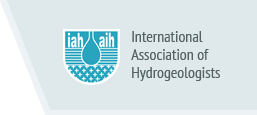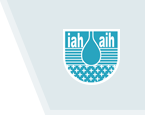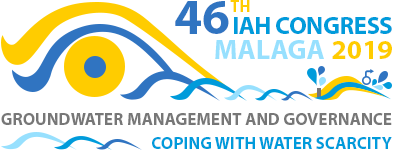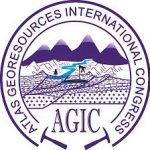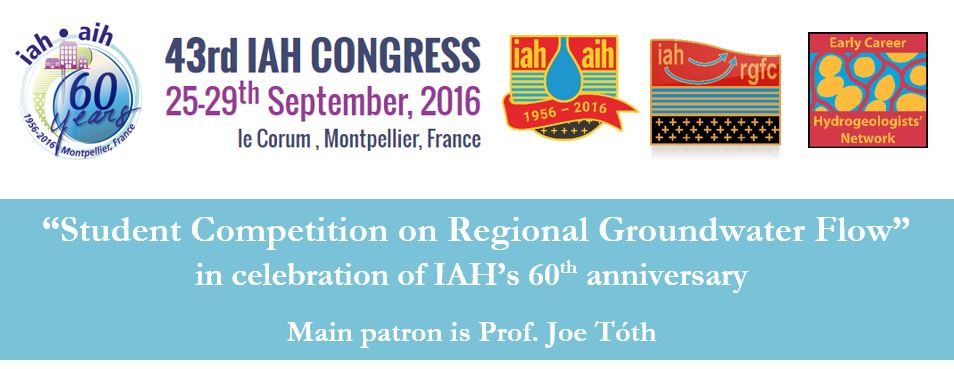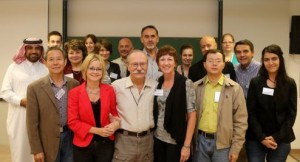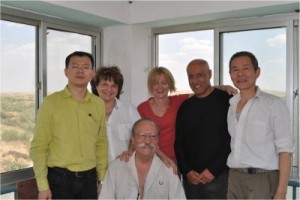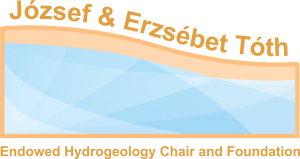Past activities
This page illustrates the past events and activities organised by the Regional Groundwater Flow Commission, or related to the topic of regional groundwater flow.
49th IAH Congress, 19-22 September 2022
The Regional Groundwater Systems and Transboundary Aquifers session was co-organised by the Regional Groundwater Flow Commission and Transboundary Aquifers Commission and chaired by Xiao-Wei Jiang, Ádám Tóth, Momčilo Blagojević and Arnaud Sterckx. The call attracted many abstracts, and therefore, two oral sessions were run during the annual Congress of IAH.
The contributions focused on new and inspiring practices related to groundwater at a larger (basin to supra-basin) level, calculation of regional groundwater flow, and advances in GIS methods are some of the sub-topics considered along with raising awareness and better understanding. Transboundary aquifers were also presented from all around the world including cross-border political, socioeconomic and environmental differences. The integration of two sub-topics (regional groundwater flow systems and transboundary aquifers) considered the experiences, new insights, and future projects in the management, monitoring and zoning of transboundary aquifers by means of groundwater flow systems, as an inspiration to those dealing with transboundary groundwater.
EGU 2022– Vienna, Austria & Online
This year the annual EGU General Assembly was held in a hybrid form in Vienna. The events of the EGU 2022 conference were scheduled between 23-27 May 2022. The EGU General Assembly 2022, the first-ever fully hybrid EGU meeting, was a great success with 12,332 presentations in 791 sessions. 7,315 colleagues from 89 countries participated on-site in Vienna, accompanied by 7,002 virtual attendees from 116 countries.
At this online event, RGFC-IAH organised a session named “The role of groundwater flow systems in solving water management and environmental problems” and convened by Jim LaMoreaux, John Molson, Daniela Ducci, Manuela Lasagna and Judit Mádl-Szőnyi. The session aimed to bring together scientists studying various aspects of groundwater flow systems. This could provide the basis for understanding local, regional, and basin-scale flow governing processes and conditions, including porous and fractured porous media. It could help to handle problems connected to groundwater management and underline the importance of sustainable development and protection of groundwater resources. Twenty-four abstracts were presented in the oral session held in the form of 5-minute-long short presentations followed by Q&A.
The EGU General Assembly 2022 in the hybrid format was an exciting experience for all the attendees. The event gave an excellent chance to meet on-site or online and share research and ideas among other researchers. We were happy to try the new form, thereby fostering the acquisition of new experiences in regional groundwater flow research. We could build new liaisons with scientists from all over the world.
The session was again a great success.
48th IAH Congress, 6-10 September 2021, Brussels, Belgium
The RGFC co-organised session, titled Regional groundwater systems and transboundary aquifers and chaired by Ádám Tóth and Hanneke Verweij, attracted many abstracts and therefore, two oral sessions were run during the annual Congress of IAH.
The contributions focused on new and inspiring practices related to groundwater at a larger (basin to supra-basin) level, calculation of regional groundwater flow, advances in GIS methods are some of the sub-topics considered along with raising awareness and better understanding. Transboundary aquifers were also presented from all around the world including cross-border political, socioeconomic and environmental differences.
It was a great pleasure and a huge success for us that this year Judit Mádl-Szőnyi, RGFC Chair received one of the most prestigious awards of the International Association of Hydrogeologists, the IAH Presidents’ Award in the framework of the Congress. The IAH Presidents’ Award was established in 1995 and is determined by the current and past presidents. It is given annually to a member who has made outstanding international contributions to groundwater science and furthering IAH’s mission to promote understanding and management of groundwater resources for the benefit of humankind and the environment.

In her acceptance speech, Judit said the following:
“I was pleasantly surprised when I learned that I am being awarded one of the most prestigious awards at IAH in 2021. I have always worked on the subject that I have been passionate about, believing that I can help people better understand groundwater flow systems and their operations.”
Due to the high importance of the event and to a large number of participants, the 48th IAH Congress was an inspiring and considerable opportunity to engage in networking, broaden our network and exchange research ideas.
International Symposium on Geofluids
The International Symposium on Geofluids was organized by the ENeRAG H2020 project in collaboration with the Eötvös Loránd University (ELTE), the József and Erzsébet Tóth Endowed Hydrogeology Chair Foundation. The scientific objectives of the event were supported by the Regional Groundwater Flow and the Managed Aquifer Recharge Commissions and the Hungarian National Chapter of the International Association of Hydrogeologists (IAH), the MOL Group and the Water MDPI Journal.
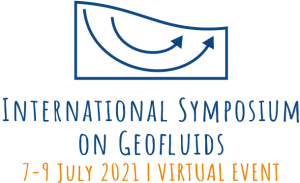
The virtual event was held 7-9 July 2021 with the main objective of bringing together scientists, professionals, and stakeholders to share and discuss all kinds of topics in geofluids, and especially groundwater, to highlight the interaction among geothermal energy, hydrocarbon, geogenic contamination and hydrothermal mineral resources.
The symposium featured 40 live lectures and 28 poster presentations on 5 main topics and the audience came from 26 different countries.
Main Topics and Sessions were:
- Energy flow systems, groundwater flow systems, related fluids and their simulations
- Managed aquifer recharge, adaptation to climate change and ecohydrology
- Geoenergy, thermal water and hydrocarbon systems
- Natural and anthropogenic contamination, vulnerability and hazards of geofluids
- Fluid–rock interactions and hydrogeochemical reactions
The standard of the event was elevated by the presentation of5 internationally renowned keynote speakers (Inga Berre from Norway, Xiao-Wei Jiang from China, Niels Hartog from the Netherlands, Vincent Post from the Netherlands, Daniele Pedretti from Italy) who shared their forward-looking and high-quality research findings with the participants.
An Interactive workshop was organized within the framework of the event, where Judit Mádl- Szőnyi, Brigitta Czauner and Ádám Tóth, demonstrated the dynamic systems approach, involving the audience with thought-provoking questions.
The symposium also included social events, where participants were able to get an insight into the mysteries of the Hungarian cuisine with a cooking competition held within the framework of the virtual gala dinner, as well as they were able to visit the streets of Budapest and get acquainted with the diverse architecture of Hungarian capital during a virtual sightseeing tour.
Judit Mádl-Szőnyi said goodbye with the following thoughts:
“The topic of geofluids connects all of us arriving from different backgrounds, professions and various stages in our career. We could learn that the understanding of flow systems and the dynamic system approach can be the key to formulating new scientific questions, and to finding solutions to theoretical and practical environmental issues.”
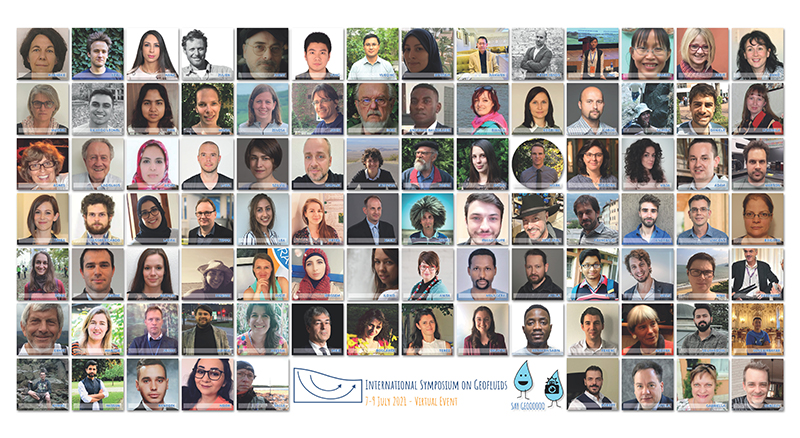
vEGU2021 – Gather Online
Due to the continuing pandemic situation, this year the annual EGU General Assembly was held online (just like in 2020). The events of the EGU 2021 conference were scheduled between 19-30 April 2021. vEGU21 included 18,155 scientists from 136 countries, attending 13 643 live presentations in 642 scientific sessions.
On this online event, RGFC-IAH organized a session named “The role of groundwater flow systems in solving water management and environmental problems” and convened by John Molson, Daniela Ducci, Jim LaMoreaux, Manuela Lasagna and Judit Mádl-Szőnyi. The session aims to bring together scientists studying various aspects related to groundwater flow systems, and their role in solving water management and environmental problems. 36 abstracts were submitted to the session, which was held in the form of 2-minute-long vPICO presentations followed by break out room discussion.
The EGU General Assembly 2021 in the online format was an exciting experience for all the attendees again. The event gave an excellent chance to meet online and share research and ideas among other researchers. We were happy to try the new platform, thereby also fostering the acquisition of new experiences in geofluid and regional groundwater flow research and we could build new liaisons with scientists from all over the world.
Final round and winners of the International Problem Solver Competition
Around a year ago, we announced the list of teams qualified for the final round of our Competition. Due to the currently developed new situation, our lives, daily routines, social activities and work habits have been changed. We were in contact with our contestants to monitor their progress in video-making to give them enough time for preparation. Finally, by the end of 2020, 7 short movies were submitted and now we are happy to announce the final results made by an international jury of 4 experts at the end of this long journey.
- GroundwatCH: Coordinated management and sustainability of land use and agriculture. How groundwater is affecting and affected? What are the concerns, limits and effects? by Aditya Vikram Jain and Ricardo Leonel Marroquín Paíz, IHE-DELFT, Institute for Water Education, UNESCO, Delft, the Netherlands
- The Origin: The drinking water – mineral water – thermal water nexus: interrelationship and aligned management. Where are the borders in quality and quantity? by Ji Taotao and Tang Xulin, China University of Geosciences, Beijing, China
- By Two: Numerical simulation of coupled fluid–heat–matter transport. What are the next-generation application aspects and possibilities? by Ying Tan and Jiaxin Shi, China University of Geosciences, Beijing, China
- Miyah: Can Managed Aquifer Recharge (MAR) mitigate groundwater depletion? Issues, aspects and possibilities in groundwater quantity augmentation and quality amelioration by Hana Ben Mahrez and Sikandar Hayat, ELTE Eötvös Loránd University, Budapest, Hungary
- Cug_gw: Overexploitation and groundwater depletion. What are the effects and innovative solution perspectives? by Zhang Yipeng and Wang Qi, China University of Geosciences, Beijing, China
- WenGer Not Arsene: Interaction of fluids and metals: novel approaches in economically feasible metal production of geothermal systems. Engineering issues and environmental impacts by Valerie Wendo and VictorGerald Nzewuji, University of Miskolc, Hungary
- Pro-gro: Water, sanitation and hygiene: improved knowledge on water quality. What is the perspective for human development? by Abiodun Olugbenga Ajayi and Arinloye Samuel, Federal University Oye Ekiti, Ekiti State, Nigeria
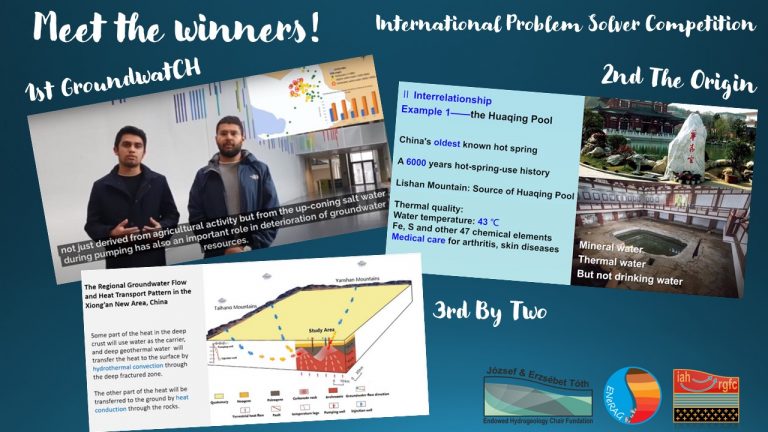
Congratulations to all teams and we are very grateful for their persistent and hard work! All contestants were awarded full-year memberships for the International Association of Hydrogeologists and the best of the bests can attend the International Symposium on Geofluids and the ENeRAG’s workshops free of charge.
The final amendment of the videos is in progress taking into consideration the comments of our experts and then the videos will be shared soon. Stay tuned!
 EGU General Assembly 2020 – EGU2020: Sharing Geoscience Online
EGU General Assembly 2020 – EGU2020: Sharing Geoscience Online
Breaking with tradition, this year the annual EGU General Assembly was held online, in an unusual way at the originally scheduled week between 4-8 May 2020. The event was named EGU2020: Sharing Geoscience Online, which brought part of the activities of the EGU General Assembly 2020 online, as a response to the COVID-19 pandemic situation.
On this online event, RGFC-IAH co-organized a session, ’Groundwater flow and geofluids system understanding with regard to environmental problems and resource management (HS8.2.9)’ with the ENeRAG H2020 project. The session’s convenors were Manuela Lasagna, Daniela Ducci, Jim LaMoreaux, John Molson, Judit Mádl-Szőnyi, Ádám Tóth, Corrado Camera and Hanneke Verweij. The session aimed to bring together scientists studying different aspects related to groundwater circulation, interaction among fluids of different nature and management of groundwater, geothermal energy and hydrothermal mineral resources.
36 abstracts were submitted to the session, which was held in the form of a live text chat on 5 May 2020 between 2-6 pm. During this timespan, 25 presentations were discussed together with a fantastic number of about 100 individual users, who joined the chat. With this number of participants, this session was one of the most popular in the Groundwater session group.
The EGU General Assembly 2020 in the online format Sharing Geoscience Online was an exciting and new experience for all the attendees. The event gave an excellent chance to meet online and share research and ideas among other researchers. We were happy to try this new platform, thereby also fostering the acquisition of new experiences in geofluid and regional groundwater flow research and we could build new liaison with scientists from all over the world.
Final round and winners of the Problem Solver Competition
The final round of the Competition for Hungarian students was held on 15 November 2019.
This Competition was initiated by the ENeRAG Excellency Network Building for Comprehensive Research and Assessment of Geofluids Horizon 2020 project in collaboration with RGFC-IAH and the József & Erzsébet Tóth Endowed Hydrogeology Chair of the Department of Geology.
University students could enter the two-round competition, which included an online test on the system approach of geofluid systems from the fluid side. Our best four groups competed at this open event by delivering their presentations about the practical aspects and application of the system approach of geofluids regarding issues and examples from their home country. Issues, challenges, possibilities, regulations and limitations were discussed on Managed Aquifer Recharge (MAR), groundwater reinjection, combined heat and metal production and volcanogenic massive sulfide ore deposit (VMS). The Problem Solver Competition aims at the assessment of geofluid resources applying the dynamic system approach by bringing it to the university level.
All of the teams gave fantastic talks and highlighted the interaction of geofluids with different origins and characters. Finally, Team Wenger not Arsene (Valerie Wendo and VictorGerald Nzewuji, University of Miskolc) and Team Miyah (Hana Ben Mahrez and Sikandar Hayat, ELTE) excelled and received the first prize and the special prize went to the Team Aquamarine (Petra Baják, Zsóka Szabó, ELTE).
Registration for EGU, attendance of ENeRAG’s workshop, memberships for the next year and other small gifts were granted to the contestants. According to the decision of the invited judges, all teams qualified for the International Problem Solver Competition.
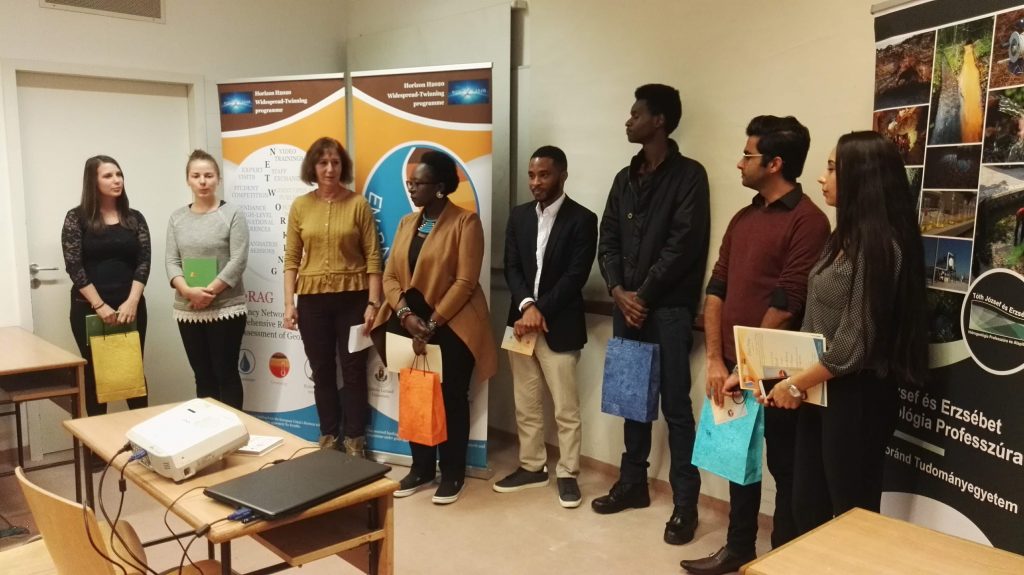
Team Aquamarine: Zsóka Szabó and Petra Baják; judge Annamária Nádor (Mining and Geological Survey of Hungary); Team WenGer not Arsene: Valerie Wendo and VictorGerald Nzewuji; Team VMS: Justine Myovela and Yohannes Kelati (absent); Team Miyah: Sikandar Hayat and Hana Ben Mahrez
46th IAH Congress, Málaga, Spain
The RGF Commission organized a special topic at the annual IAH Congress, 22–27 September 2019, Málaga, Spain. The congress of this year devoted special focus on Groundwater Management and Governance: Coping with Water Scarcity.
The topic entitled Innovative approaches for understanding groundwater flow systems was supported by the EU H2020 ENeRAG (Excellency Network Building for Comprehensive Research and Assessment of Geofluids) project. The sponsored 4 oral and 1 poster sessions dealt with a wide range of methodologies applied in hydrogeology from the more conventional technologies (such as hydrogeological mapping, hydrodynamics, hydrochemistry, isotopes, tracers, etc.) to the most innovative new trends in modelling. Altogether 19 oral and 11 poster presentations were included, they were attended by around 100 delegates of the Congress. We were delighted that many of these provided recent results regarding the theoretical progress, research methods and future development of regional groundwater flow.
In addition, Carlos Molano’s Groundwater Spreadsheets short course was devoted to providing the basic concepts and mechanisms of movement and storage of water and chemical compounds in porous media, applying analytical and numerical modelling using spreadsheets. Spreadsheets are powerful tools we use extensively in our lives for many purposes in many fields and are an excellent means to teach and learn groundwater flow and pollution.
Furthermore, RGFC held its annual meeting in Málaga. Review the progress of the ongoing RGFC activities and discuss the further steps and new ideas that were in focus among the 20 Commission members.

Panoramic view of one of the RGFC’s oral sessions
GAC-MAC-IAH Québec 2019, 12–15 May 2019

The 2019 GAC-MAC-IAH/CNC Conference was held in Quebec City, Canada from May 12-15th 2019 and was a great success. This conference was a combined event, hosting three related associations – the Geological Association of Canada, the Mineralogical Association of Canada, and of course, the Canadian National Chapter of the IAH. As North American co-chairs of the IAH Regional Groundwater Flow Commission, Dr John Molson (Université Laval) and Dr René Lefebvre (INRS) participated on the local organizing committee which was chaired by Dr Michel Malo of the INRS Institute, Quebec City.
Over 740 participants registered for the 3-day conference, including 63 members of IAH/CNC and 19 student IAH members. The conference also included several short courses held on Sunday, and field trips, including to the Charlevoix impact crater about 100 km east of the city. The impact occurred over 400 million years ago and is visible today as a 50-km diameter basin on the edge of the Canadian Shield. The rocks associated with this impact are highly fractured and faulted; of note in the area is the famous Logan Fault which separates units of the Appalachian Orogeny from Palaeozoic sedimentary rocks. Evidence for prior hydrothermal activity was also noted. The area is the most seismically active zone in eastern Canada.
Another field trip entitled Champlain Sea Deltas focussed on Quaternary geology and hydrogeology of landforms resulting from the invasion of the Champlain Sea into the St. Lawrence River Valley following the retreat of the glaciers about 10,000 years ago. Fluvioglacial deposits have formed many good aquifers in the St. Lawrence Valley, while marine clays from the Champlain Sea serve as confining layers which still contain significant chloride concentrations which can degrade water supplies.
Dr Barbara Sherwood Lollar, of the University of Toronto, and 2019 recipient of Canada’s highest research award, the Gerhard Herzberg Medal, gave the IAH/CNC keynote address, with an inspiring talk on 1-2 billion-year-old groundwater discovered in deep mines of the Canadian Shield, and of evidence for microbial communities at these depths. Dr Dick Jackson, of the University of Waterloo and GeoFirma Ltd., and 2013 recipient of the Farvolden Award in Hydrogeology, gave an engaging lunch-time talk on resource development and risks to groundwater.
During the conference, over 10 special sessions focussed on hydrogeology-related topics, including Deep groundwater circulation and its potential influence on shallow water resources and ecosystems, Hydrogeology of cold regions, Groundwater nutrients and contaminants affecting surface waters, Geochemical and isotopic tracers in groundwater studies, Groundwater and Climate Change, Challenges in measuring and modeling of groundwater/surface water interactions, Emerging Contaminants in Soil and Groundwater, and a session on General Hydrogeology. A meeting of the IAH/CNC committee was held on Sunday, and the Annual General Meeting was held later Tuesday afternoon, Chaired by IAH/CNC president, Dr Diana Allen of Simon Fraser University, British Columbia, Canada. A general poster session was held at the end of each day, over a few refreshing cold drinks.
On Tuesday evening, a dinner-cruise on the Saint Lawrence River was enjoyed by many, including a great view of the Montmorency Falls, which we are proud to say are even higher than Niagara Falls!
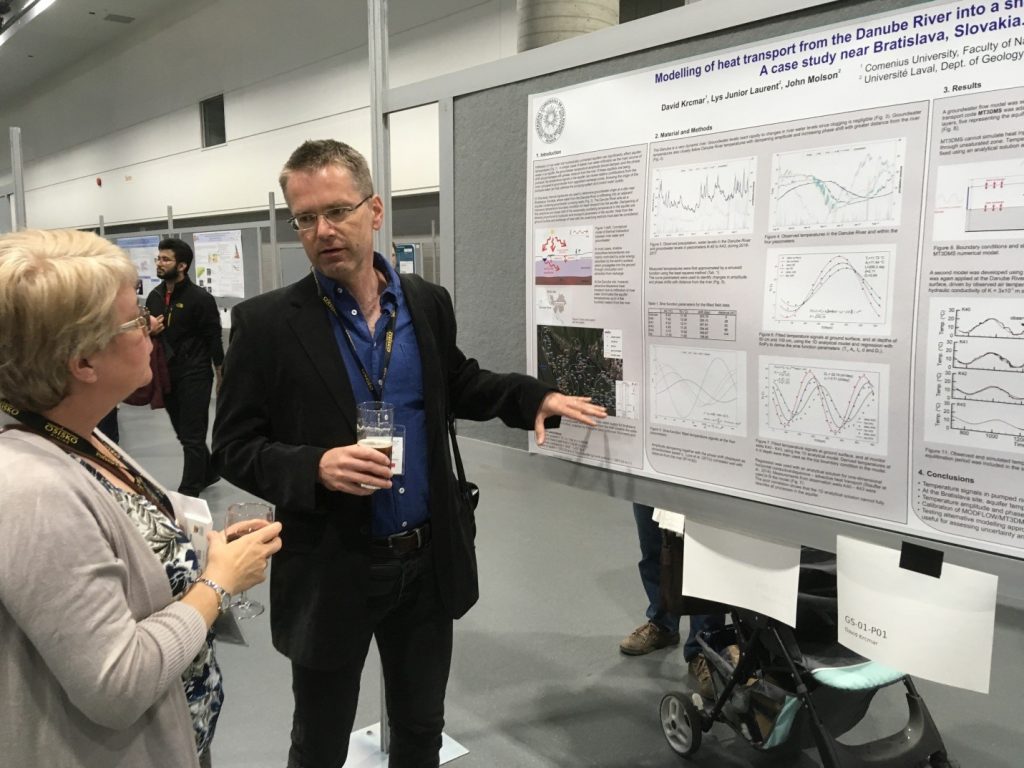
Poster session: Dr David Krcmar (Comenius University, Bratislava, Slovakia) explaining his poster
to Dr Diana Allen, president, IAH/CNC Canada
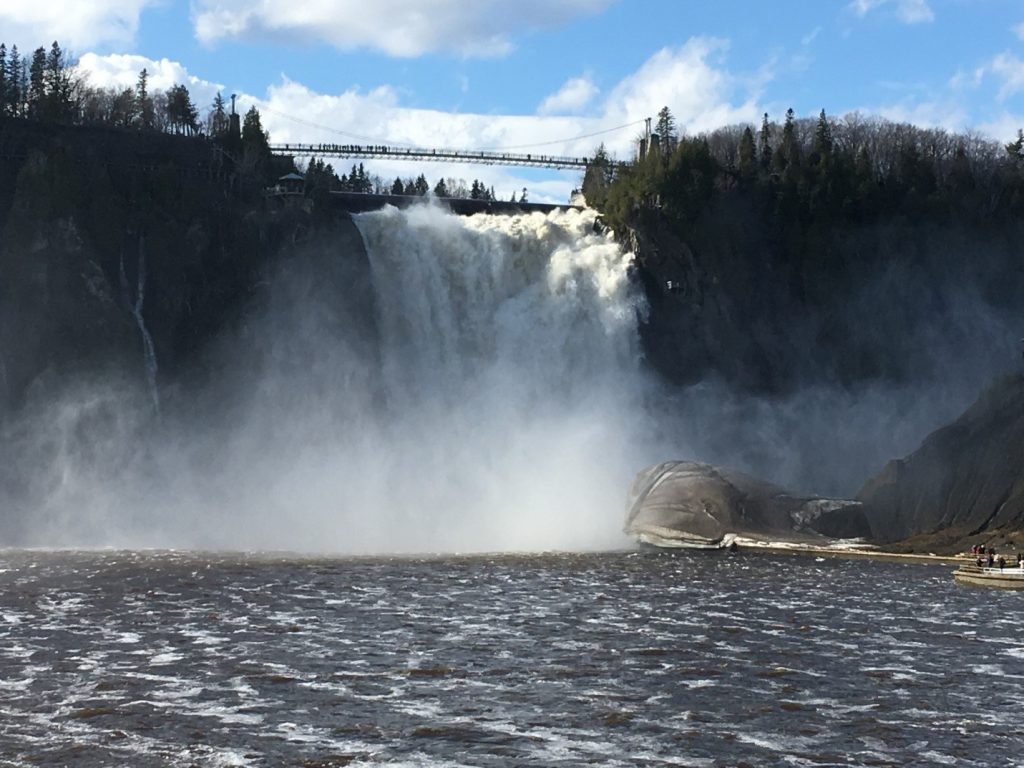
Montmorency Falls, near Quebec City
EGU General Assembly 2019
Our Commission co-sponsored two sessions at the European Geosciences Union (EGU) General Assembly, 7–12 April 2019, Vienna, Austria: “Geofluids as natural resources or sources of contamination: Research and Innovation (supported by RGFC-IAH and ENeRAG)” convened by Daniele Pedretti, Alex Russell, Ádám Tóth, Frank McDermott, Marie-Amélie Petré and “Groundwater flow understanding in water management and environmental problems” convened by Manuela Lasagna, Daniela Ducci, Jim LaMoreaux, John Molson, Judit Mádl-Szőnyi.
The 1+2 oral blocks and the related poster sessions attracted 7+13 oral presentations and 18+16 posters. The freshly launched geofluid session received very positive feedback, its multidisciplinarity and the wide range of topics fostered new ideas and synergies. The “regular” groundwater flow system session was again a great success, it included a broad range of topics and techniques such as groundwater management, geochemical characterization of groundwater flow systems and knowledge of groundwater flow system from local to regional scale. All of the presentations attracted great attention, especially the dynamic poster walk-through session.
Moreover, RGFC and the ENeRAG Geofluids H2020 project had a joint meeting. The collaborators could discuss future activities planned in cooperation, such as a Special Issue on Geofluids.
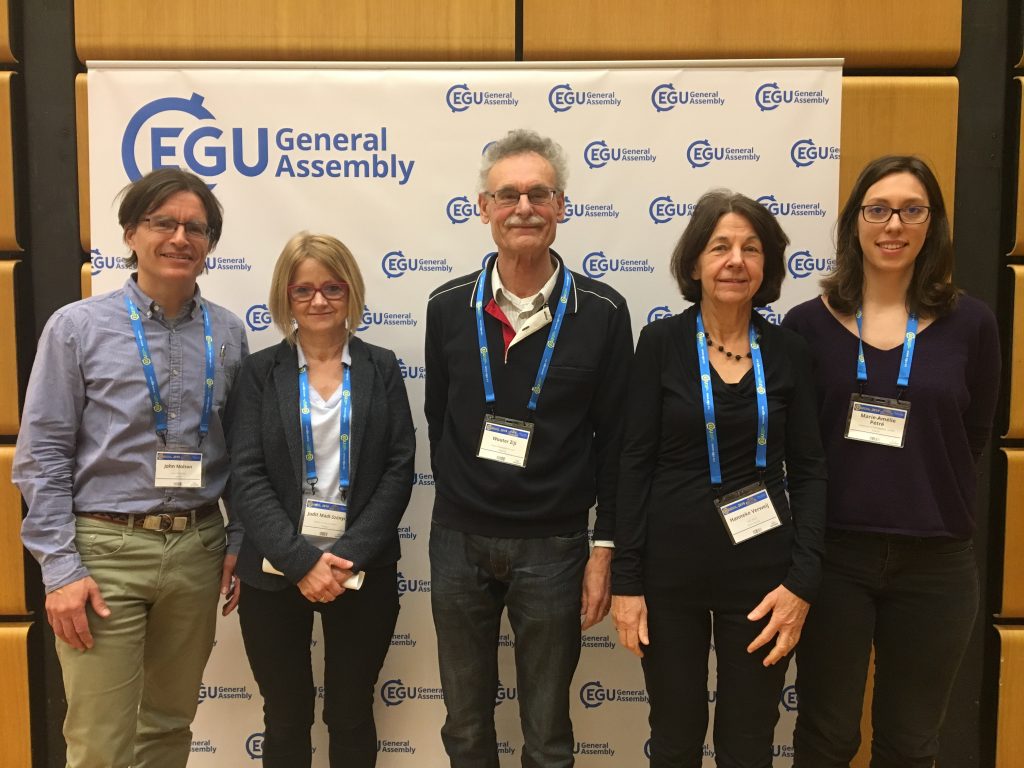
Session conveners, presenters and RGFC representatives: John Molson (Canada, RGFC Co-chair),
Judit Mádl-Szőnyi (Hungary, RGFC Chair), Wouter Zijl (Belgium),
Hanneke Verweij (the Netherlands, RGFC Co-chair) and Marie-Amélie Petré (France)
AGIC2019 Applied Geosciences for Groundwater, Hammamet, Tunisia, 28–30 March 2019
The Laboratory of Georesources (LGR) at the “Centre for Water Research and Technologies (CERTE)” and the “Tunisian Committee of Hydrogeology (TCH)” at the “Association Eau et Développement (AED)”, which is the Tunisian Chapter of “International Association of Hydrogeologists (IAH)”, were pleased to organize the 2nd Atlas Georesources International Congress (AGIC 2019) in Hammamet, Tunisia. It brought together researchers, research scholars, experts and policymakers to share their research, experiences and discuss recent advances in Applied Geosciences for Groundwater. The conference covered many aspects related to groundwater and had a special session entitled “Regional Groundwater Flow Systems”. It anticipated analysing issues connected to groundwater management and related environmental protection defining physical and chemical degradation in the context of groundwater flow system functioning. Contributions related to alternative methods of defining groundwater flow components and their application in establishing, regulating and mitigating negative environmental impacts to and from groundwater were presented.
45th IAH Congress, Daejeon, Republic of Korea
RGFC organized one of the Congress sessions in Topic 7 entitled Innovation in regional groundwater flow understanding. In addition to 16 oral presentations in the session, around 20 other delegates, including students from more than 10 countries contributed with their oral and poster presentations on the topic of regional groundwater flow elsewhere in the Congress. We were delighted that many of these provided recent results regarding the theoretical progress, research methods and future development of regional groundwater flow.
In addition, Joel Carrillo’s short course highlighted the importance of the regional groundwater flow. The identification and usage of direct and indirect indicators of the flow systems were discussed in the course using a wide system view. Practical applications of the flow systems include efficient groundwater extraction and integrated water management practice.
Furthermore, RGFC held its annual meeting in Daejeon. Chair Judit Mádl-Szőnyi and Co-chairs Joel Carrillo and Xiao-Wei Jiang summarized the achievements of the past year and discussed tasks for the coming year.

RGFC Annual Meeting
The prize of our representative, Samira Ouysse
Samira Ouysse (National Council of Science and Technology, Autonomous University of Zacatecas, México) attended the International Symposium Ecology-2018, 19–23 June, in Kastamonu, Turkey. Her topic was on the study of ecosystems conservation, with the application of groundwater flow systems. The topic was quite new to participants and organizers and they appreciated it, therefore she was awarded as the Young Researcher of the Year. Her presentation’s title: Regional Paradigm for Studying Ecosystems Conservation in Baja California Peninsula (Central Desert Region). You can access a related paper here.
EGU General Assembly 2018
Our Commission sponsored a session entitled “Groundwater flow understanding in water management: Environmental problems and potential interactions with subsurface water ecosystems” at the European Geosciences Union (EGU) General Assembly, 8–13 April 2018, Vienna, Austria. The 3 oral blocks and poster sessions attracted altogether 18 oral presentations and 25 posters. The session was a great success, it included a broad range of topics and techniques such as groundwater management and its protection from qualitative and quantitative degradation, geochemical characterization of groundwater flow systems and knowledge of groundwater flow system from local to regional scale. The presentations attracted great attention. The presenters came from countries in Europe, Asia, the Americas and Africa to examine and discuss water management and groundwater flow system characterization related issues. The Convenor was Jim LaMoreaux with the help of Co-Convenors: Daniela Ducci, Manuela Lasagna, Xiao-Wei Jiang, René Lefebvre, Luc Aquilina, Judit Mádl-Szőnyi, Christine Rivard, Chrystel Dezayes and Alexis Defresne.
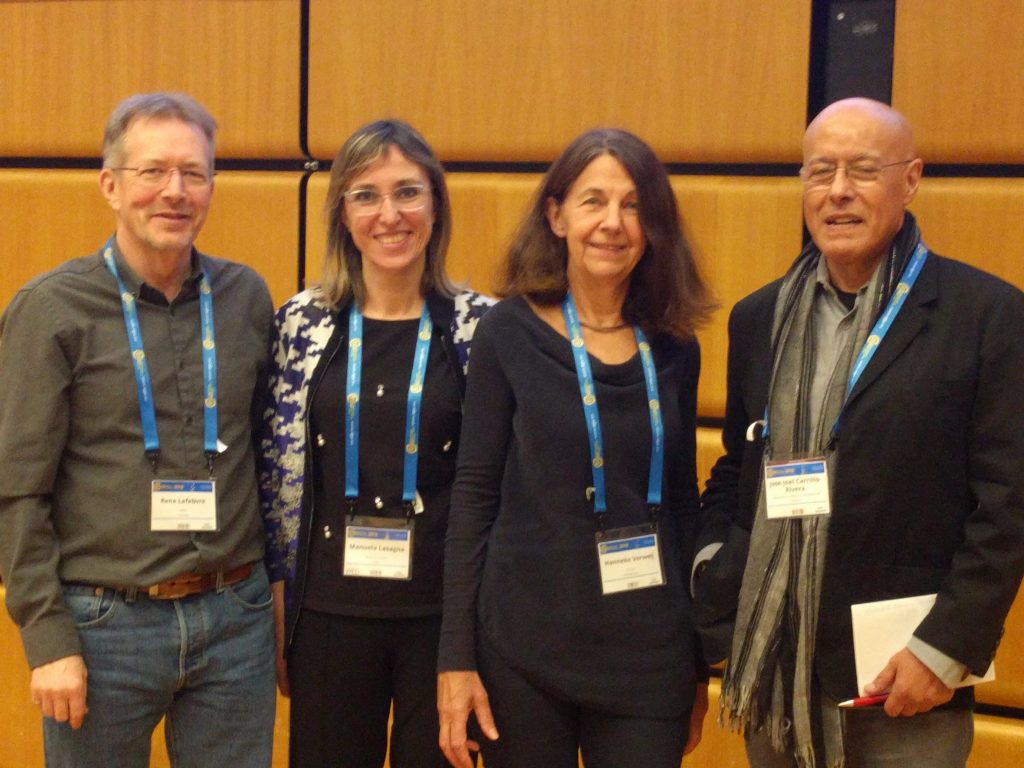
Session Conveners René Lefebvre (RGFC Co-Chair), Manuela Lasagna, presenters and RGFC Co-Chairs Hanneke Verweij and José Joel Carrillo-Rivera
6th International Water Forum Conference
Hammamet, Tunisia, 19-21 March 2018
The IWFC-2018 is the 6th of the ambitious bi-annual scientific international conferences focused on a joint understanding of water sources, groundwater functioning, water resources, as well as in water engineering approaches, management, and technology. This time the IWFC-2018 was held in Hammamet, Tunisia, 19-21 March 2018. The conference aimed to share updated information and methodologies to stimulate scientific discussion and environmentally orientated communication among participants. This conference encourages the participation of students, experts, scholars as well as decision-makers in agreeable fields related to water, not only from the MENA region but, at an international level to partake in this endeavour. Research abstracts that were programmed to participate presented studies from Algeria, Benin, Canada, Congo, Côte d’Ivoire, Egypt, France,
Germany, Hungary, Italy, Mexico, Morocco, Palestine, Tunisia, Turkey, and the United States.
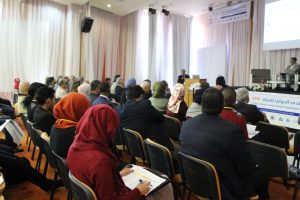
The total number of attendees was 278. The RGFC-IAH Special Session included 10 oral presentations on groundwater flow systems. The meeting had the participation of distinguished groundwater lectures Chair Judit Mádl-Szőnyi, Co-Chair Joel Carrillo-Rivera and Secretary Ádám Tóth, Udo Weyer (Canada), and local participants as Belgacem Agoubi and Faten Telahigue (Higher Institute of Water Sciences and Techniques, Gabes University) and Fayrouz Slama (Higher Engineering School, University of Tunis Al Manar). One of the Conference Chairs and keynote speakers was Joel Carrillo-Rivera.
This event was a very nice occasion for promoting the theory of groundwater flow.

44th IAH Congress, Dubrovnik, Croatia
The Regional Groundwater Flow Commission co-organized a session at the 44th IAH Congress titled Groundwater management and energy source development in a changing climate (T 1.2). The oral and poster sessions attracted several contributions in a wide range of topics including surface water-groundwater connection, managed aquifer recharge, groundwater management, numerical and geochemical analysis and predicted effects of climate change. The session was conveyed by Ádám Tóth (Eötvös Loránd University, Budapest, Hungary, RGFC Secretary) and Roland Barthel (University of Gothenburg, Sweden).
Regional groundwater theory was also present at other topics and sessions such as karst hydrogeology, hydrochemistry of thermal and mineral waters and groundwater-dependent ecosystems. During the social events and breaks, the Commission offered willingly its support to the organisers of the upcoming IAH Congress held in Daejeon, South Korea.
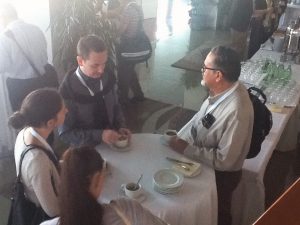
The representatives proposed some topics and possible sessions to enrich the Korean Congress. The details of the planned CRC blue book was also discussed with Janjaap Blom (CRC Press). The need for cooperation between Groundwater and Energy and Regional Groundwater Flow Commissions was realized as well.
RGFC Coffee break: fruitful discussion while enjoying the coffee with Carlos Molano, Vice President – Latin America and the Caribbean
Characterizing regional groundwater flow systems: Insight from practical applications and theoretical development, 26–28 June 2017, Calgary, Canada
Calgary Symposium was organised by the Regional Groundwater Flow Commission in cooperation with the Canadian National Chapter of IAH. The two-day-long Symposium had altogether 65 oral and poster presentations and 2 keynote lectures: Okke Batelaan had a talk about the past, present and future of flow systems, and Grant Garven presented geofluids leakage along an active plate boundary. Distinguished guest Prof. Joe Toth – claimed himself as the dinosaur of hydrogeology – summarised the takeaway message of the fruitful and scientifically rich Symposium: „The theory is very much alive and it is broadening”.
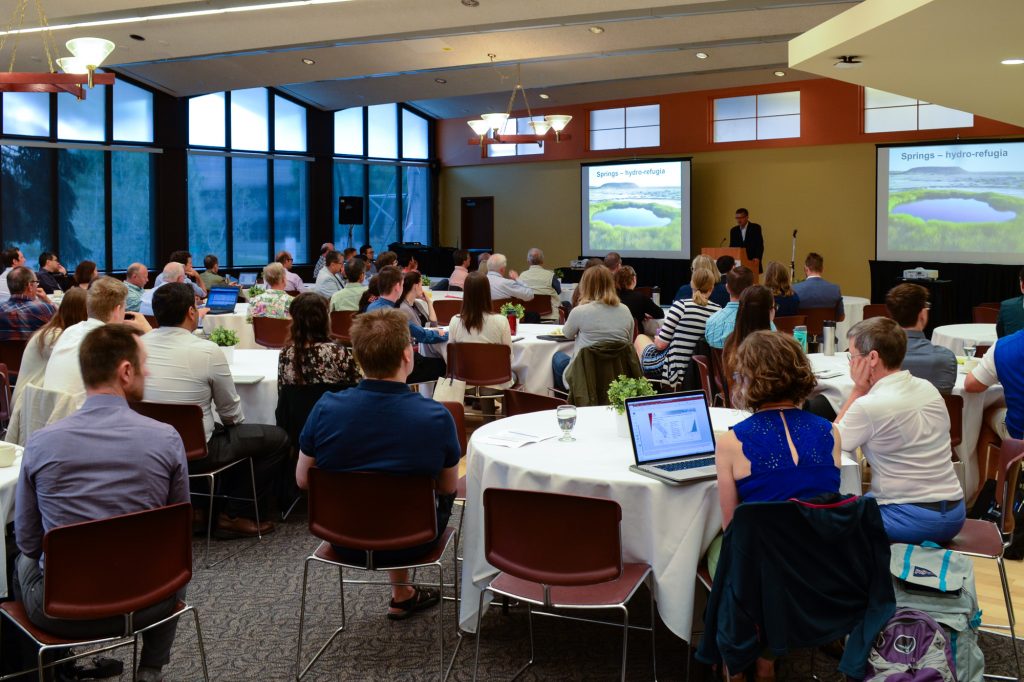 Keynote Lecture of Okke Batelaan
Keynote Lecture of Okke Batelaan
Educational lecture about groundwaters
Ádám Tóth, our Secretary, had an educational lecture about groundwater fundamentals and state of groundwater in Hungary. The presentation was titled Groundwaters in Hungary and held at the Focus on Water summer school (9-22 August, Budapest) which was attended by 20 Japanese and 15 Hungarian students. The basic theory of groundwater flow was outlined and consequences of flowing groundwater, such as geothermal energy, landslides, speleogenesis, vegetation, were presented via Hungarian case studies. The lecture was followed by a cave walk in the Szemlő-hegy cave where the hypogenic speleogenesis caused by hot water could be seen on the field.
Farvolden prize
The Robert N. Farvolden Award is used to honour outstanding contributions to the disciplines of earth
science and engineering that emphasize the role or importance of groundwater. In 2016, our active Commission Member, René Lefebvre received the prize. He has his Farvolden Award acceptance speech in October at the IAH-Canada meeting, which will be on regional groundwater resources management.
Congratulations to René!
Commission evaluation by David Kreamer, the new IAH Vice President for Science and Programme
The Commission received the following letter from the new IAH Vice President for Science and Programme, David Kreamer. He acknowledged the activity of the RGFC and also the scientific value of our publications and hoped to continue this work in the future.
“As a new fellow at this job, I reviewed your 2012- 2015 CRGF Annual Reports which are posted on the IAH website, and have read and greatly admired many of your publications in the past. I also saw your independent CRGF-IAH website link to the main IAH website, which is really very good and well illustrated. It is a really great website and quite informative. … your work and efforts have been world class for many years – thanks! I’ve had the pleasure of reading some of your individual publications on groundwater flow, and know that your individual work is outstanding. I’m aware that you have put much effort into integrating many groups working together on similar issues, and I’m particularly pleased to see all of your educational and outreach efforts, and your upcoming conference this June in Calgary. You and your colleagues have put significant energy into this Commission and I would like to offer my assistance in any way to ensure that you keep going strong, are reaching other scientists and decision makers, and advancing your fundamental objectives.”
RGFC representatives in the new IAH Council
The Council of IAH, appointed by election by the full membership every four years, is the Association’s governing body. Our current Council was elected at the General Assembly in Montpellier, France in September 2016.
Two of our active RGFC representatives are now members of the IAH Council:
Joanne Thompson – Vice President, North America
Carlos Molano – Vice President, Latin America and the Caribbean
The Commission wishes them a great success in the IAH Council.
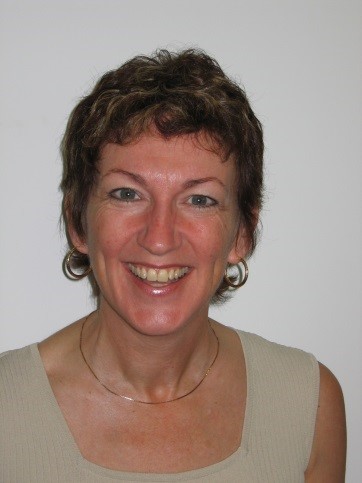
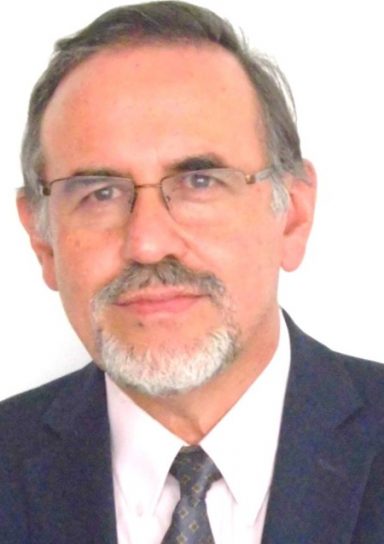
EGU General Assembly 2017
Our Commission co-organized a session entitled “Groundwater Vulnerability and Circulation” at the European Geosciences Union (EGU) General Assembly 23-28 April 2017, Vienna, Austria. The session attracted 6 oral presentations and 18 posters. During the oral presentations, around 40 people attended the session. The session included a broad range of techniques such as hydrochemistry, environmental tracers, and numerical modelling. These methods have been applied in countries in Europe, Asia, America and Africa to examine groundwater vulnerability and circulation problems.
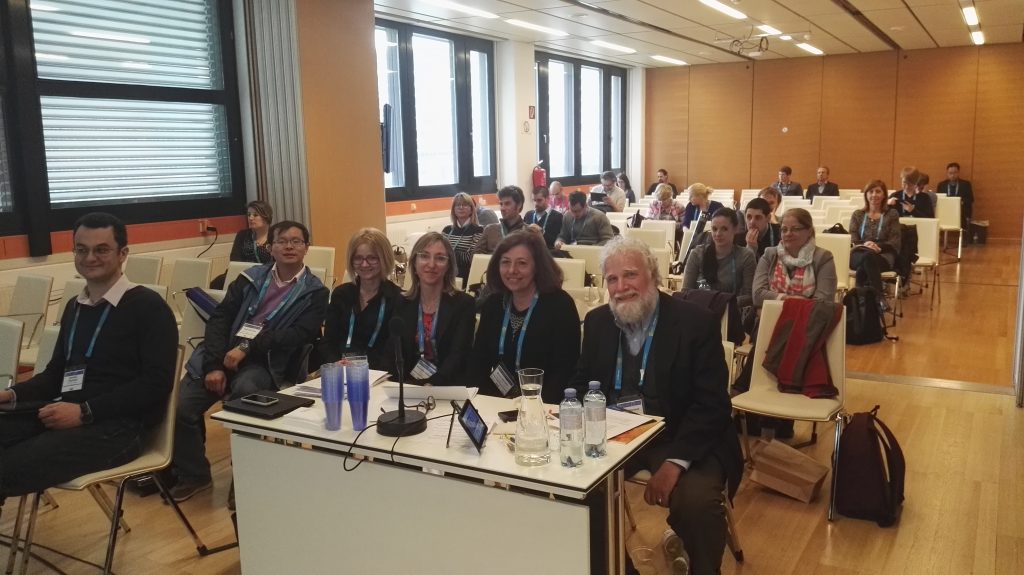
Session conveners: Xiaowei Jiang, Judit Mádl-Szőnyi, Manuela Lasagna, Daniela Ducci and Jim LaMoreaux
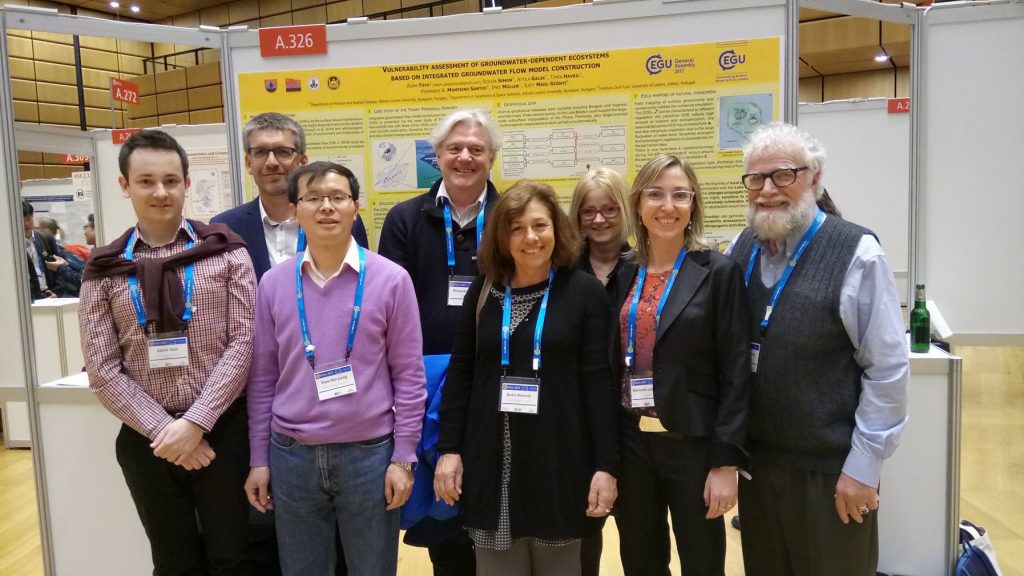
RGFC Secretary Ádám Tóth, Co-Chairs Okke Batelaan and Xiao-wei Jiang, Richard Martel, Session Co-Conveners Daniela Ducci, Judit Mádl-Szőnyi (RGFC Chair) and Manuela Lasagna,
Session Convenor Jim LaMoreaux
Visit of Joel Carrillo-Rivera in Budapest
Prof. Carrillo-Rivera had an academic visit 24-31 March 2017 in Budapest supported and financed by the Hungarian Ministry of Foreign Affairs and Trade. He had a talk on Groundwater law proposal for Mexico at the Directorate of Water Management of Hungary. In the frame of József & Erzsébet Tóth Endowed Hydrogeology Chair, Prof. Carrillo-Rivera gave a short course entitled Groundwater flow systems and vertical flow, which was attended by master and PhD students of the Eötvös Loránd University.
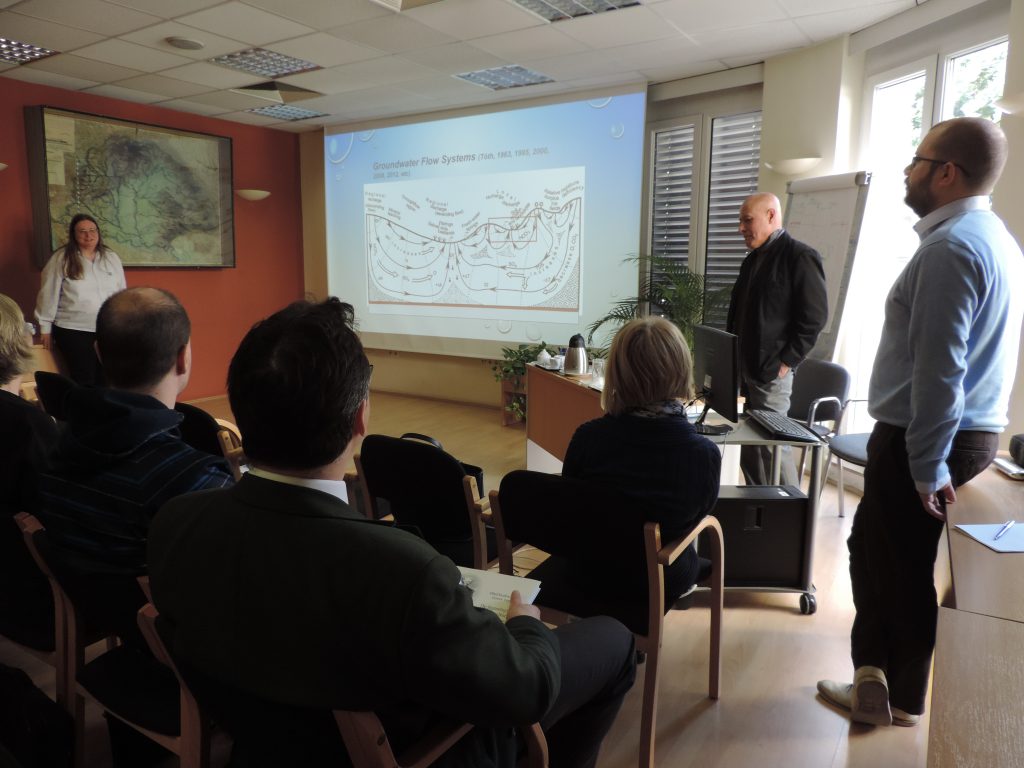
Lecture at the Directorate of Water Management of Hungary
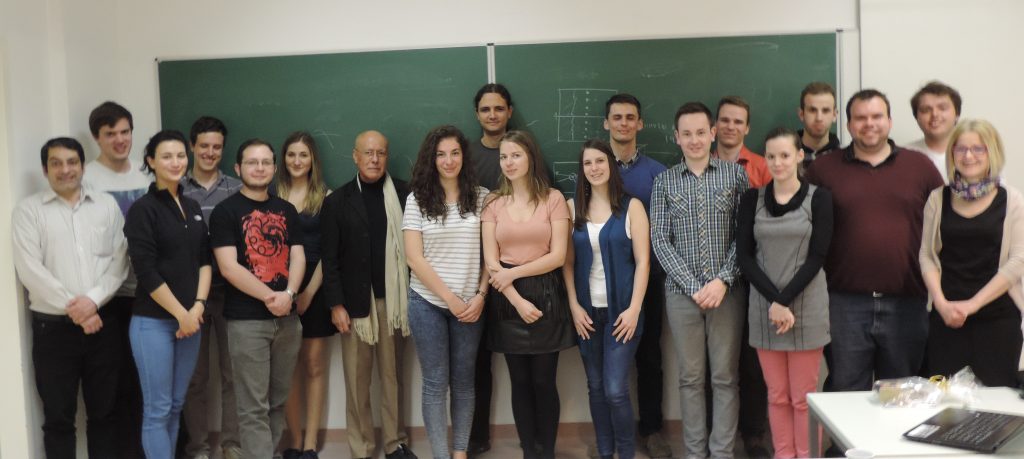
Attendees of the short course at the Eötvös Loránd University
Groundwater Flow Systems in Secondary School Education
Carlos Molano in his recent Seminar on Hydrogeology (Quito, Ecuador) promoted a new Hungarian Geography book as an example to introduce Regional Flow and flow system Analysis to students at elementary level.
You can access this book here on page 162-165.
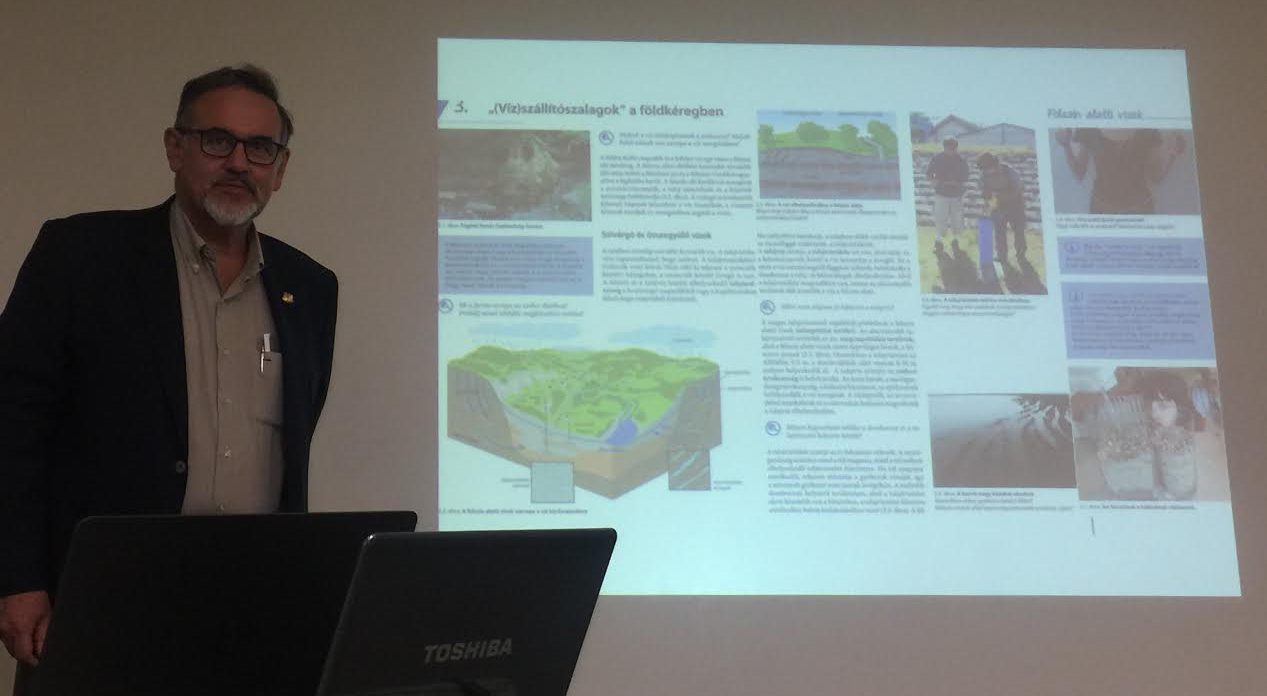
Endowed Hydrogeology Chair funded by Joe Tóth at ELTE, Budapest
József and Erzsébet Tóth Endowed Hydrogeology Chair 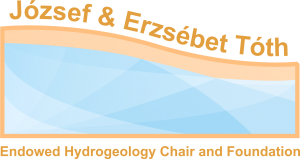 was founded on 1 September 2016 at Faculty of Science, Eötvös Loránd University, Budapest thanks to the generous donation of Prof. József Tóth. The main scope of the Chair is teaching, fostering, promotion and application of the „Tóthian” modern hydrogeological approach. The elaboration and preservation of the famous library of Tóth were also integrated into the activity of the Chair. The head is Judit Mádl-Szőnyi (Chair of RGFC) and she cooperates with her colleagues, PhD and MSc students in the frame of this group to urge the recognition of the vital Tóthian scientific heritage. The chair would like to attract scientific interest worldwide.
was founded on 1 September 2016 at Faculty of Science, Eötvös Loránd University, Budapest thanks to the generous donation of Prof. József Tóth. The main scope of the Chair is teaching, fostering, promotion and application of the „Tóthian” modern hydrogeological approach. The elaboration and preservation of the famous library of Tóth were also integrated into the activity of the Chair. The head is Judit Mádl-Szőnyi (Chair of RGFC) and she cooperates with her colleagues, PhD and MSc students in the frame of this group to urge the recognition of the vital Tóthian scientific heritage. The chair would like to attract scientific interest worldwide.
GSA 2016 Meeting, Denver
The Commission co-sponsored a session at the Geological Association of America (GSA) Annual Meeting in Denver, Colorado (25 to 28 September 2016). The session was entitled “Approaches to characterizing groundwater flow systems at the watershed-scale for water management and regulation” and attracted 13 oral presentations and 13 posters. The session was very well attended (40 to 90 people during the oral presentations) and included presentations from RGFC’s own Brian Smerdon (session co-chair) and Xiao-Wei Jiang. Many of the presentations focused on achieving a balance between measurements at discrete points and using these to provide insight to large regions. The session included a broad range of techniques such as classical hydraulic analysis (hydraulic heads and water levels), use of environmental tracers, and numerical modelling.
Beyond our session, the regional groundwater flow concept was observed in several other sessions, including “Quantifying Groundwater/Surface Water Interactions in the Field and on the Computer”, “Can’t Take the Heat? Temperature as an Indicator and Tracer of Environmental Change”, and “From Pores to Mountains, and Minutes to Millennia: Session Dedicated to the Contributions of Rob Bowman, Fred Phillips, and John Wilson”.
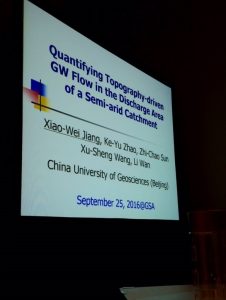
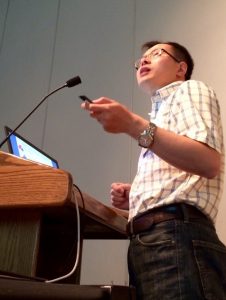
Presentation of Xiao-Wei Jiang at the GSA Meeting 2016, Denver
43rd IAH Congress at Montpellier, France
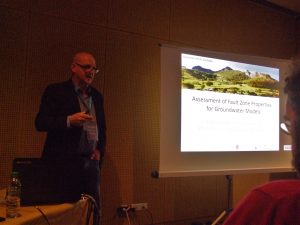 The Commission organized sessions at the IAH Congress in celebration of IAH’s 60th anniversary titled Verification of conceptual patterns and expected natural effects of regional groundwater flow by interpretation of relevant field observations. The session’s objective was to encourage comparisons between theoretical predictions of flow patterns and their natural effects in a given study area, on one hand, and measurable parameters of their real-life flow-fields and empirically observed manifestations of interaction between moving groundwater and its environment in the same area, on the other. The two oral sessions and one e-poster session covered the topics of fault zone hydrogeology, petroleum hydrogeology, ecohydrogeology, numerical simulation of groundwater flow and basin hydrodynamics, especially the linkage of observed Presentation of Jim Underschultz
The Commission organized sessions at the IAH Congress in celebration of IAH’s 60th anniversary titled Verification of conceptual patterns and expected natural effects of regional groundwater flow by interpretation of relevant field observations. The session’s objective was to encourage comparisons between theoretical predictions of flow patterns and their natural effects in a given study area, on one hand, and measurable parameters of their real-life flow-fields and empirically observed manifestations of interaction between moving groundwater and its environment in the same area, on the other. The two oral sessions and one e-poster session covered the topics of fault zone hydrogeology, petroleum hydrogeology, ecohydrogeology, numerical simulation of groundwater flow and basin hydrodynamics, especially the linkage of observed Presentation of Jim Underschultz
manifestations of flowing groundwater and modelling of on fault zone hydrogeology
subsurface processes.
Conveners were Judit Mádl-Szőnyi (Eötvös Loránd University, Hungary), René Lefebvre (Centre Eau Terre Environnement, INRS, Canada), Carlos Molano (Universidad de los Andes, Colombia), John Molson (Université Laval, Canada), Jose Joel Carrillo-Rivera (UNAM, Mexico) and Ádám Tóth (Eötvös Loránd University, Hungary).
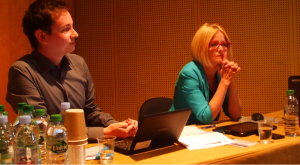
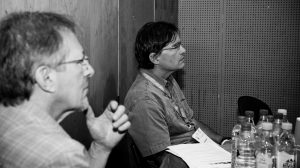
Chairs Ádám Tóth, Judit Mádl-Szőnyi, René Lefebvre, and John Molson
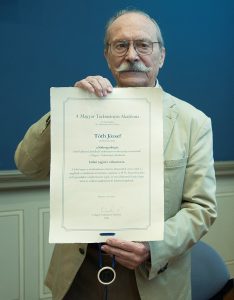 Joe Tóth became a member of the Hungarian Academy of Sciences
Joe Tóth became a member of the Hungarian Academy of Sciences
The Commission is pleased to announce that Professor József Tóth, the Lifetime Honorary Chair of RGFC, has been elected as a member of the Hungarian Academy of Sciences. His lecture Theory of the Tóthian groundwater flow and its consequences from 1963 to nowadays demonstrated the two ramifications of the umbrella theory, namely the basin-scale hydraulics and groundwater as a geologic agent. IAH joins the Commission in offering congratulations to him!
Final results of the Student Competition on Regional Groundwater Flow
The RGFC celebrated IAH’s 60th anniversary in the form of Student Competition on Regional Groundwater Flow in collaboration with the ECHN, IAH Executive and organizers of the 43rd IAH Congress. After the first, online, round nine university teams qualified for the second round held in Montpellier, where different regional groundwater flow topics were presented by each of them. Teams of the second round:
Hydro Puff Girls, University of Miskolc, Miskolc, Hungary
Rotomagus, University of Rouen, Rouen, France
ITB Hydrogeology, Institut Teknologi Bandung, Bandung, Indonesia
Looking at the Basin!, China University of Geosciences, Beijing, China
ENSEGID, Ecole Nationale Supérieure en Environnement, Géoressources et Ingénierie du Développement durable, Bordeaux, France
UofA Hydro, University of Alberta, Edmonton, Canada
Flow-ers, Eötvös Loránd University, Budapest, Hungary
INOWAS, TU Dresden, Dresden, Germany
The Hydraulic Heads, University Laval, Québec, Canada
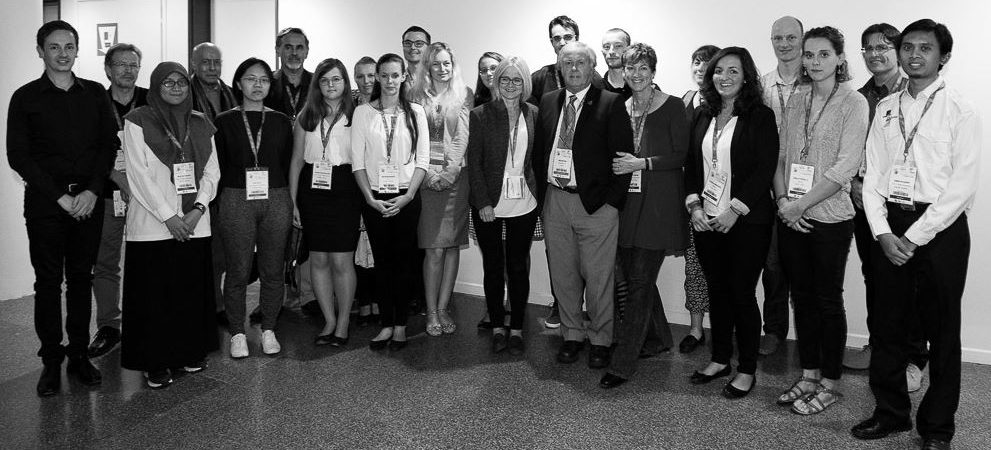 Contestants, judges and organizers of the Student Competition on Regional Groundwater Flow
Contestants, judges and organizers of the Student Competition on Regional Groundwater Flow
The Commission is pleased to announce the final results of the competition. Firstly, we would like to congratulate all of the teams for their efforts to learn more about regional groundwater flow. Four teams excelled during the event:
The prizes are one-year memberships for 2017 provided by IAH, additional small prizes granted by IAH–RGFC and regional groundwater flow related books.
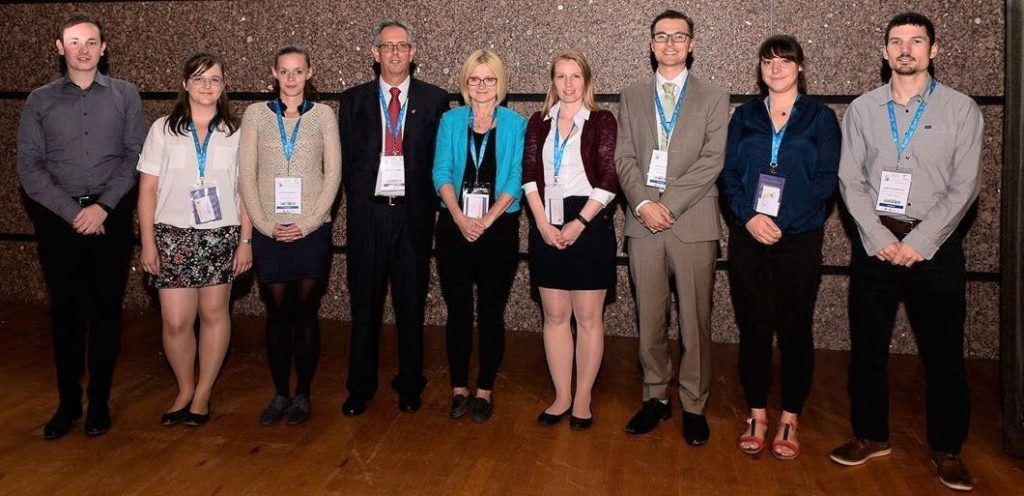 The initiators and awardees of the Student Competition on Regional Groundwater Flow: Ádám Tóth, Virág Török and Katalin Csondor (Flow-ers), António Chambel, Judit Mádl-Szőnyi, Judit Déri-Takács and Daniel Skoreyko (UofA Hydro), Debora János and Marc Laurencelle (The Hydraulic Heads)
The initiators and awardees of the Student Competition on Regional Groundwater Flow: Ádám Tóth, Virág Török and Katalin Csondor (Flow-ers), António Chambel, Judit Mádl-Szőnyi, Judit Déri-Takács and Daniel Skoreyko (UofA Hydro), Debora János and Marc Laurencelle (The Hydraulic Heads)
Editors’ Choice paper by our Co-Chair Brian Smerdon
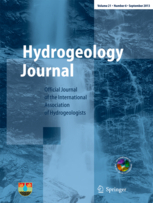 Each year five articles from among the annual crop of about 150 published in Hydrogeology Journal are designated as “Editors’ Choice”. These articles are ones that the Editors believe readers will find particularly interesting or useful. These articles were selected for one or more of several good reasons including outstanding science, innovative approach, potentially important conclusions, interesting field area or phenomenon, unusual topic, political, social, historical, philosophical interest, etc.
Each year five articles from among the annual crop of about 150 published in Hydrogeology Journal are designated as “Editors’ Choice”. These articles are ones that the Editors believe readers will find particularly interesting or useful. These articles were selected for one or more of several good reasons including outstanding science, innovative approach, potentially important conclusions, interesting field area or phenomenon, unusual topic, political, social, historical, philosophical interest, etc.
One of these Editors’ Choice articles of 2015 is:
Brian D. Smerdon, Chris Turnadge 2015: Considering the potential effect of faulting on regional-scale groundwater flow: an illustrative example from Australia’s Great Artesian Basin. Hydrogeology Journal 23/5, 949–960.
Springer is making these articles freely accessible to all readers for two months from the publication of this editorial message. You can access the paper here.
Congratulations to Brian and his co-author!
New Board members
In the General Meeting, a new officer was proposed for the RGFC Board to lead the task of research and developments in the Commission, into which Prof. Okke Batelaan (Flinders University, Adelaide, Australia) was elected. This activity group involves the broadening the circle of colleagues who consciously and habitually take flow systems into consideration when dealing with their own special hydrogeologic problem, and fostering the worldwide co-operation between researchers and institutes dealing with theoretical and practical aspects of regional groundwater flow.
The General Meeting also promoted the idea to have a secretary to the Board, who would assist organization and management issues. Ádám Tóth (Eötvös Loránd University, Hungary) was elected for this position.
You can check our new members at the RGFC Committee page.
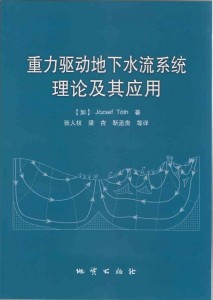 “Gravitational Systems of Groundwater Flow” released in Chinese
“Gravitational Systems of Groundwater Flow” released in Chinese
The book of József Tóth “Gravitational systems of groundwater flow: theory, evaluation, utilization” has been translated into Chinese to spread the basics of gravity-driven regional groundwater flow and related phenomena among Chinese hydrogeologists.
József Tóth, 2009 (translated by Zhang Renquan, Liang Xing, Jin Menggui et al, 2015). Gravitational system of groundwater flow: Theory, evaluation, utilization. Beijing: Geological Publishing House. 210 pages.
2000 printed copies; first edition, September 2015.
EGU General Assembly 2016
RGF Commission co-organised a session in Vienna at EGU General Assembly 2016 titled “Groundwater vulnerability and circulation” with 6 oral presentations and 17 posters. Chair Jim LaMoreaux and co-chairs Manuela Lasagna, Daniela Ducci, Bartolomé Andreo-Navarro, Judit Mádl-Szőnyi and Xiao-Wei Jiang coordinated the session highlighting the role of regional groundwater flow in vulnerability assessment and also social and economic aspects. Papers were invited to bring together scientists studying different aspects related to vulnerability and groundwater circulation.
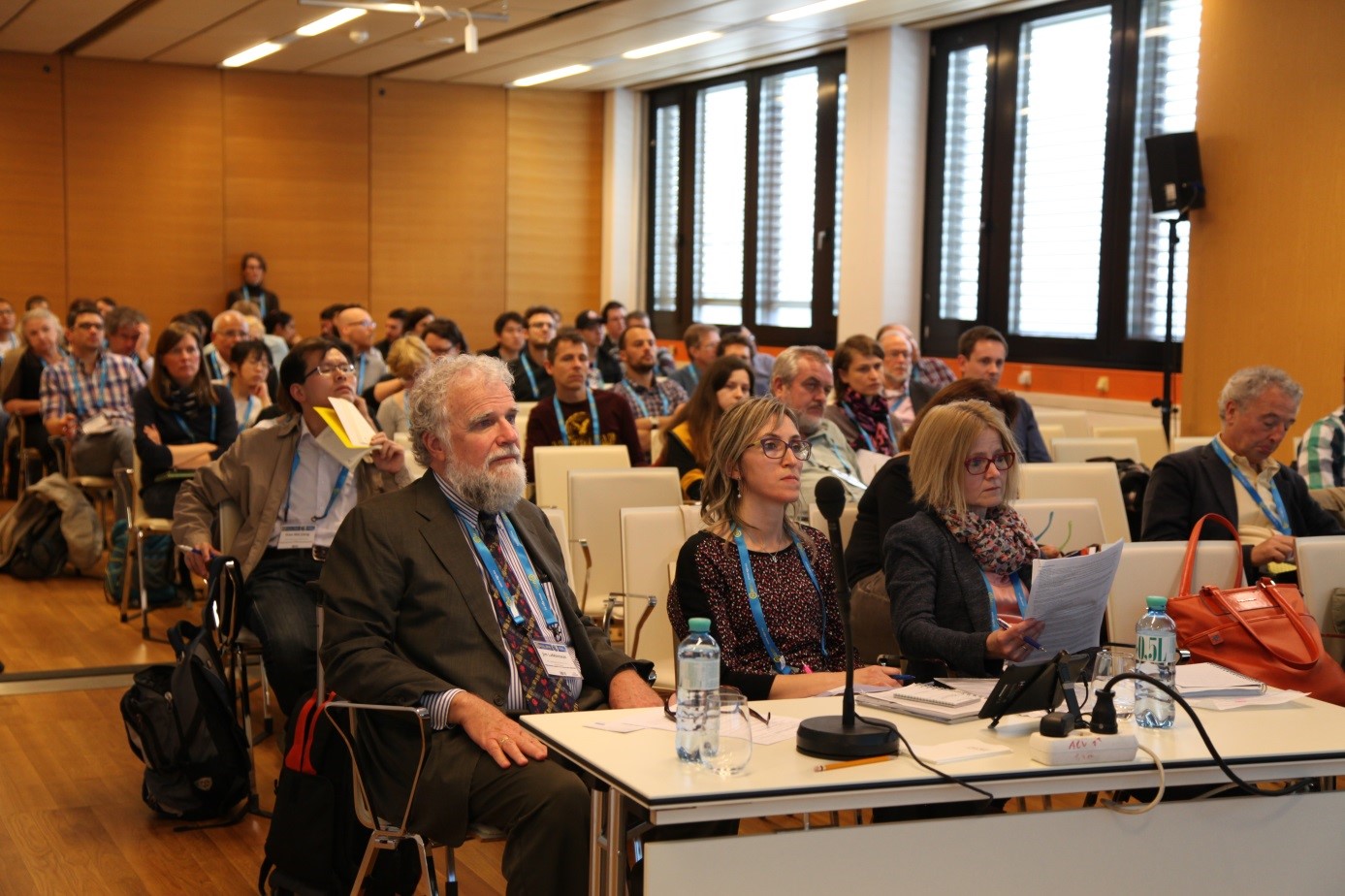
Chair Jim LaMoreaux, co-chairs Manuela Lasagna and Judit Mádl-Szőnyi, chair of RGFC

RGFC representatives from China and Hungary at poster session: Xiao-Wei Jiang, Petra Bodor, Ádám Tóth, Menggui Jin, Timea Havril and Szilvia Simon
Groundwater flow system definition: natural manifestations and controls – 10-16 January 2016, Tunis, Tunisia
A successful Groundwater Workshop for the Middle East & North Africa (MENA) was organised in partnership with the Institute of Geography of UNAM (Igg-UNAM), Mexico; the National School of Engineers of Tunis (ENIT); the Faculty of Sciences of Tunis (FST); The World Academy of Sciences (TWAS); the Research Institute for Development (IRD), and the commissions of the International Association of Hydrogeologists: Regional Groundwater Flow (RGFC), and Groundwater Outreach (GOC); financed by the Igg-UNAM and TWAS; and hosted by ENIT.
The principal aim of the Workshop was to introduce modern hydrogeological concepts to define, manage and control groundwater and its related environmental issues, with special emphasis on sharing expertise and perspectives related to groundwater flow systems.
The co-chair of RGFC and GOC Dr José Joel Carrillo-Rivera gave around 26 presentations and one public lecture which highlighted the practical application of the regional groundwater flow systems methodology through the case studies from Mexico, Argentina, Cuba and Colombia. Moreover, four PhD students presented and discussed their research advancement.
The Workshop included two field visits as well. The objective of the first one was to be acquainted with the Kamech permanent experimental of monitoring surface water and shallow groundwater to understand mechanisms of recharge. The other site was the Thermal Spring of Korbous situated in Cap Bon region. A field monitoring of this regional groundwater flow manifestation was proposed to understand its overall functioning.
The Workshop was attended by PhD and MSc students, as well as early career researchers, of whom 84% were women. Participants came from different research institutes and universities across Tunisia. At the end of the Workshop, participants took an exam and the results were very satisfactory. They evaluated the niveau of the Workshop regarding the relevance of its content, coaching, discussion, quality of lecturing and material distributed. The overall result was 85%. Most participants expressed their interest to have a second Workshop with emphasis on hydrogeological and geochemical modelling, and the use of isotope content to understand groundwater functioning at regional and local scales.
Thanks and recognition are given to Drs L. Guellouz and F. Slama from ENIT, and to S. Ouysse from Igg-UNAM. Special thanks are to be addressed to Dr F. Hamzaoui (FST) for launching this initiative, and to Dr R. Bouhlila and the LMHE-ENIT laboratory staff for allowing the premises of the ENIT as the venue and to the disposal of the participants.
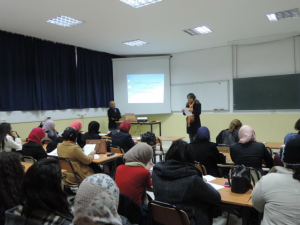
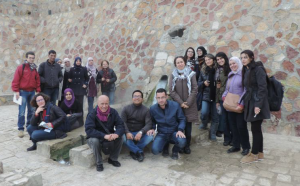
Workshop lecture and field visit to the Korbous thermal spring (~60°C) in Northern Tunis
IAH Commissions co-sponsor Mexico Groundwater Colloquium – November 2015
A three-day National Colloquium on Groundwater in Mexico, held (Nov 11-13) in the Senate Building in Mexico City addressed the importance of having the scientific understanding of regional groundwater flow concepts as a basis for groundwater management. The meeting venue, inside the Mexican Senate building, provided a great opportunity to increase legislator awareness of the vulnerability of Mexico’s aquifers to overpumping.
The program was organized by the Instituto de Geografia, UNAM (National Autonomous University of Mexico) and several Mexican Water Agencies. The event was attended by approximately 100 politicians, political advisors, municipal officials, water and groundwater agencies and academics. The event was co-sponsored by two IAH Commissions, Regional Groundwater Flow and Groundwater Outreach.
A listing of all the Colloquium II presentations is at http://www.senado.gob.mx/comisiones/cambio_climatico/docs/coloquio_agua.pdf
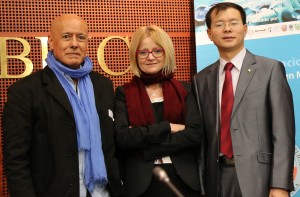
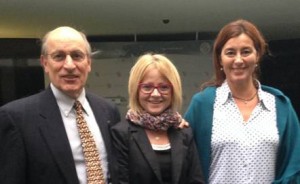
RGFC representatives: José Joel Carrillo-Rivera Colloquium presenters: Andrew Stone (USA)
(Mexico), Organiser, Judit Mádl-Szőnyi (Hungary) Director, Commission on Groundwater Outreach,
and Xiao-Wei Jiang (China) Judit Mádl-Szőnyi and Elisabet Wehncke, Secretary, IAH Mexican Chapter
AQUA2015, IAH Congress – Rome, Italy
Our Commission organised a session in Rome titled: “Discharge area: a fingerprint of groundwater flow conditions” with 11 oral presentations and 2 posters, focusing on various topics such as karst hydrogeology, wetland ecology, soil salinization, ore deposition and surface water interaction. A total of 9 countries participated in the session including United Kingdom, Australia, Hungary, Mexico, China, Italy, Slovakia, Canada and Japan. Chair Judit Mádl-Szőnyi and Co-chair Lucio di Matteo coordinated the session discussing the main issues facing regional groundwater flow research and highlighting the future challenges in this field. Papers were invited emphasizing the quantitative understanding of flow systems and concentrating on the shift of focus from recharge to discharge, and its economic and practical importance.
A highlight of the Congress was Prof. Richard Taylor’s (Co-Chair of the Commission of Groundwater and Climate Change) invited presentation in the RGFC Session. He had a lecture on the topic of „Assessing the resilience of groundwater use at low latitudes: interrogating evidence from groundwater discharge observations”.
The importance of dealing with hydrogeology at a regional scale was a main issue during the entire Congress and it emerged clearly in the course of the debate, particularly in the session T3 on the “sustainable use of groundwater” and in the session T6 regarding “groundwater governance and policy”. Indeed, regional studies are fundamental for assessing groundwater resources and it is only at the regional scale that social, economic and ecological impacts can be integrated in order to provide significant solutions. In this framework, it seems clear that regional groundwater flow is an extremely important topic for the hydrogeological community worldwide and that more hydrogeologists should take part in the RGFC activities in the future.
Find out more: http://www.iah2015.org and https://twitter.com/AQUA2015_IAH
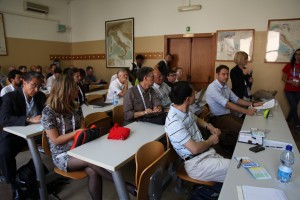
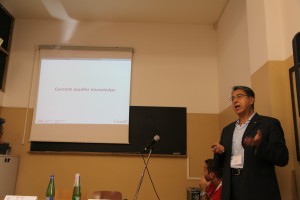
Audience of the RGFC’s session Lecture of Prof. Alfonso Rivera
Awardees of the Best Research Paper on Regional Groundwater Flow
The IAH RGFC with the support of the IAH Executive and ECHN initiated a competition in the AQUA Congress on regional groundwater flow. The RGFC received 18 applications for the Best Research Paper on Regional Groundwater Flow Competition. There was a preliminary assessment based on submitted abstracts, and relevance of regional groundwater flow. During the Congress, a panel of experts evaluated the oral or poster presentations based on technical quality, presentation and also the relevance of regional groundwater flow.
Four prizes were awarded during the closing ceremony for the best oral or poster presentations addressing either theoretical or practical aspects of regional groundwater flow. Shared 1st prize was given to Jiale Wang (China University of Geosciences, Wuhan, China) and Ádám Tóth (Eötvös Loránd University, Budapest, Hungary), shared 2nd prize was given to Giorgia Lucianetti (Roma Tre University, Rome, Italy) and Szilvia Simon (Eötvös Loránd University, Budapest, Hungary).
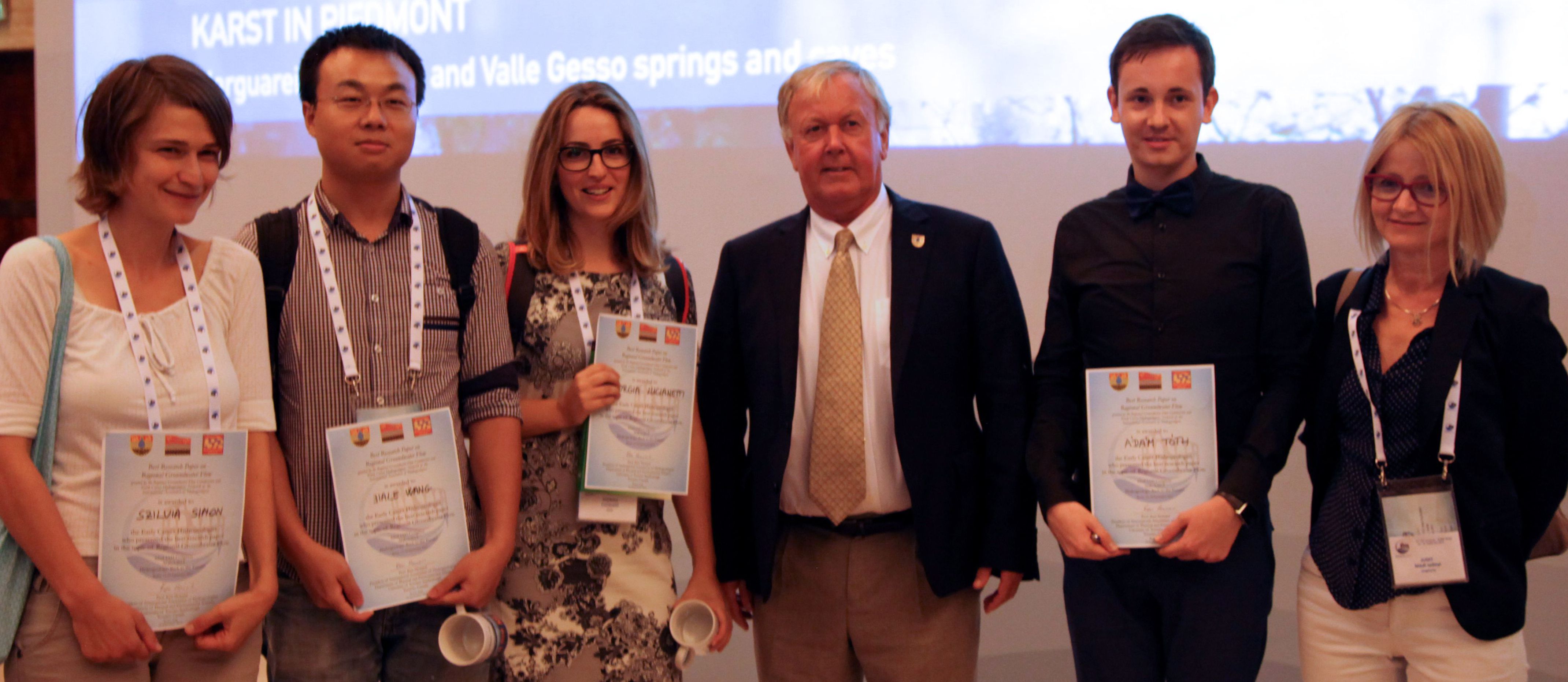
The initiators and awardees of the Best Research Paper on Regional Groundwater Flow: Szilvia Simon, Jiale Wang, Giorgia Lucianetti, Prof. Ken Howard (President of the IAH), Ádám Tóth and Prof. Judit Mádl-Szőnyi (Chair of the RGFC)
Abstracts of awarded presentations can be downloaded here: Jiale Wang, Ádám Tóth, Giorgia Lucianetti and Szilvia Simon.
Report from EAGE/TNO Workshop, May 2015
Hydrodynamics in Hydrogeology and Petroleum Science
The dissemination of knowledge of flow system approach is one of the main tasks of RGFC. It seemed to be evident at the first EAGE/TNO Basin Hydrodynamic Systems workshop that petroleum hydrodynamics, including unconventional resources, the principles of hydraulic continuity and cross-formational vertical flow on a basinal scale, should be implemented into the approach for better understanding. Prof. Hanneke Verweij focused on vertical leakage and hydraulic continuity related to the position of petroleum accumulations. Professor Richard Swarbrick (University of Durham and Swarbrick GeoPressure, UK) highlighted the need for the exchange of hydrogeological knowledge. There was an excellent and fruitful workshop in Utrecht with interactive debates, wrap up sessions and roundtable discussions. Supporters of the RGFC-IAH were very active in the dissemination of knowledge with lectures and remarks by Professor József Tóth (University of Alberta, Edmonton, Canada); Prof. Jim Underschultz (University of Queensland, Australia); Prof. René Lefebvre (INRS, Quebec, Canada); Prof. Wouter Zijl (Vrije University Brussel, Belgium); Prof. Judit Mádl-Szonyi (University of ELTE, Budapest, Hungary) with the scientific group of ELTE, Hungary and with eminent professionals such as Udo Weyer and Dan Palombi etc. The prominent experts of oil companies such as Hugh Dennis (Cairn Energy) who was a keynote speaker, Johannes Wendebourg and Jean-Jacques Biteau (TOTAL, France) and Y. Yang from Saudi Aramco outlined the state of the art of petroleum hydrodynamics. Professor Ann Muggeridge (Imperial College, UK) had an extraordinary lecture about reservoir compartmentalization. The hydrodynamic aspects of geothermal energy utilization and CO2 sequestration were also concerned. The discussion should be continued to proceed with the understanding of subsurface hydrodynamic systems as a whole. Thanks to Prof. Hanneke Verweij for organising the event.
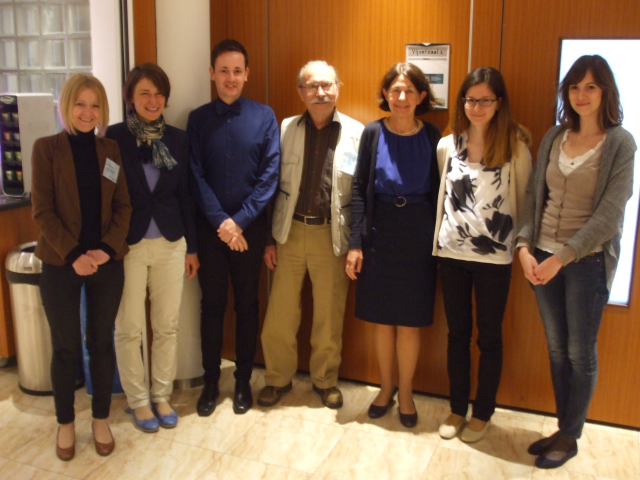
The Hungarian attendants and the organiser of the First EAGE/TNO Workshop:
Prof. Judit Mádl-Szőnyi, Szilvia Simon, Ádám Tóth, Prof. József Tóth,
Prof. Hanneke Verweij (TNO, Utrecht, the Netherlands), Petra Bodor and Timea Havril
IAH Congress, 2014 – Marrakech, Morocco
RGFC held its annual meeting in Marrakech. Chair Judit Mádl-Szőnyi and Co-chairs Joel Carrillo and Xiao-Wei Jiang summarized the achievements of the past year and discussed tasks for the coming year.
RGFC organised one of the Congress sessions in Theme 7: “Regional Groundwater Flow as a Geologic Agent and a Management Tool”. In addition to 7 oral presentations in the session, around 20 other delegates, including students from more than 10 countries contributed with their oral and poster presentations on the topic of regional groundwater flow elsewhere in the Congress. We were delighted that many of these provided recent results regarding the theoretical progress, research methods and future development of regional groundwater flow.
In addition, Carlos Molano’s short course on groundwater spreadsheets highlighted the importance of regional groundwater flow. A questionnaire investigation was conducted during the Congress and 34 completed questionnaires were received, 27 of them indicating the researcher was familiar with the theory of regional groundwater flow, but only 15 knew the RGFC Committee. In response, RGFC aims to engage more hydrogeologists in its activities and has already set up a LinkedIn group which is open to both members and non-members of IAH.
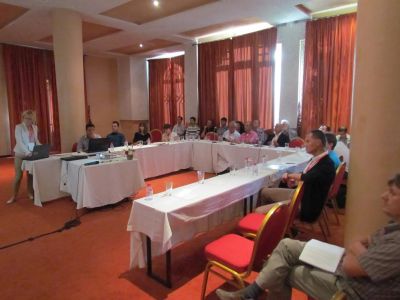
RGFC’s 2014 meeting, Morocco
5th International Student’s Geological Conference sponsored by IAH ECHN & IAH RGFC
24-27 April 2014, Budapest
The 5th International Student’s Geological Conference was held at the Faculty of Science, Eötvös Loránd University, Budapest (Hungary).
The conference included a wide range of scientific sessions, 6 plenary lectures on the applications of interesting methods and current results in geosciences, 4 workshops connected to the main sessions and 5 exciting field trips representing many different disciplines of the earth sciences.
The Hydrogeology and Environmental Geology Session and the coffee breaks between the sessions were sponsored by the International Association of Hydrogeologists. The professional background was ensured by Regional Groundwater Flow Commission of the IAH and Early Career Hydrogeologists’ Network.
230 BSc, MSc and PhD students, as well as young researchers from 3 continents and 20 countries, participated in the conference. Approximately 10% of the presentations and posters from the 10 sessions related to the Hydrogeology and Engineering Geology Session. The jury of the Session was made up of the members of the IAH-RGFC: Dr Anita Eross, Dr Szilvia Simon and Dr János Viszkok.
The best oral presentation awarded to Dejan Neskovic (from the University of Belgrade, Serbia), while the best poster prize awarded to Ádám Tóth (Eötvös Loránd University, Budapest).
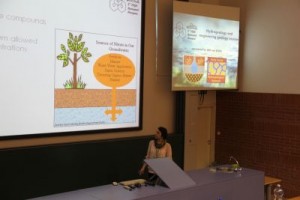
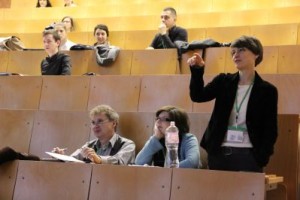
Hydrogeology Session at 5th ISGC Jury of Hydrogeology Session at 5th ISGC
Colloquium on Groundwater in México, 7-9 November 2013
The the “Colloquium on Groundwater in México” took place on 7-9 November 2013. The basic objectives of the Colloquium were: i) to determine which information about groundwater is available, ii) What kind of information would be desirable to have, and iii) How to fix the gaps and deficiencies found.
The sponsors were the International Atomic Energy Agency; The Environmental Prosecutor and Landplaning Office of Mexico City; the National Council of Science and Technology; the universities of Zacatecas and Puebla; the Centre for Environmental Research and the Institute of Geography, both from UNAM; the National Institute of Statistics and Geography; and the commissions of the International Association of Hydrogeologists on Regional Flow Systems and on Groundwater Outreach to Decision Makers.
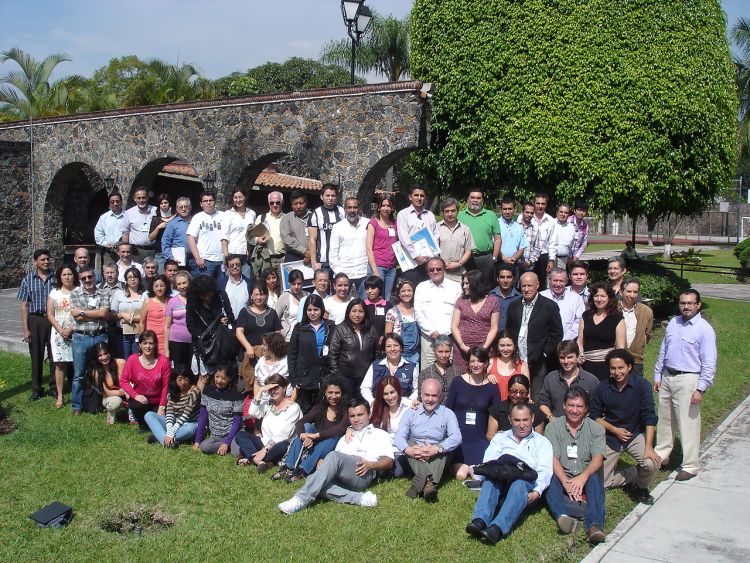
Participants of the Colloquium in Mexico
International Symposium on Hierarchical Flow Systems in Karst Regions
4-7 September 2013, Budapest, Hungary
This symposium introduced the concept of gravitational groundwater flow systems in the thinking and practice of the karst community and was a collaboration between IAH’s Regional Groundwater Flow Commission (RGFC; ourselves), IAH’s Karst Commission and the Karst Hydrogeology and Speleogenesis Commission of the International Union of Speleology (UIS).
To supplement the scientific programme, a pre-Symposium course, REGFLOW – MANKARST, introduced the theoretical and practical aspects of regional groundwater flow and karst hydrogeology. The Symposium honoured Professor József Tóth, in celebration of his 80th birthday. Around 150 researchers from 35 countries attended the symposium and the pre-symposium training courses.
- Read the summary written by Chris Groves here.
- Read the report “Successful Symposium in Hungary” by Joanne Thompson in the IAH-CNC Bulletin.
- The abstract book including the field trip guide, many presentations and the photo gallery is available here.
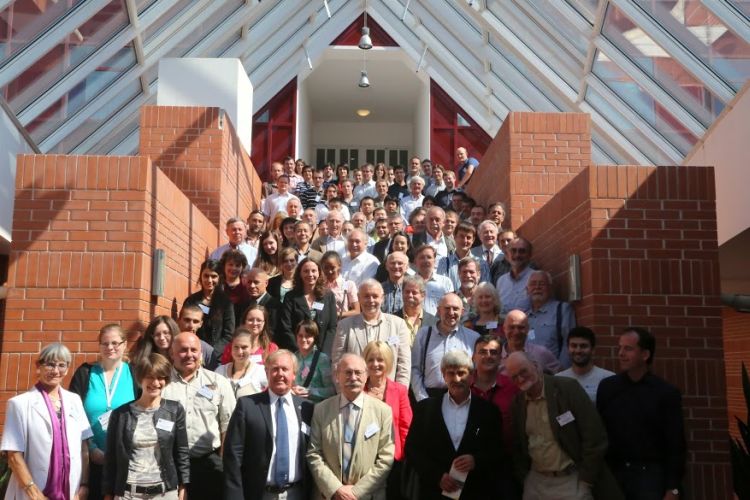
Participants of Karstflow Symposium
REGFLOW-MANKARST course, 2-3 September, Budapest, Hungary
Prior the “International Symposium on Hierarchical Flow Systems in Karst Regions”, to supplement the scientific programme, the REGFLOW-MANKARST course introduced theoretical and practical aspects of regional groundwater flow and karst hydrogeology.
The aim of the REGFLOW (Regional Groundwater Flow) course was to introduce the concept of gravity-driven groundwater flow, its geological and environmental consequences, application and relevant investigation methods. The lecturers were Prof. József Tóth (University of Alberta, Eötvös Loránd University), Szilvia Simon (Eötvös Loránd University) and Brigitta Czauner (Eötvös Loránd University).
The MANKARST course (Hydrogeology and Management of Karst Groundwater Resources) introduced the unique nature of karst systems and the most important investigative methods with a focus on geophysical and tracing techniques for the characterization of both local/shallow and regional/deep karst systems. The lecturers were Nico Goldscheider (Karlsruhe Institute of Technology, Germany) and Tim Bechtel (Franklin & Marshall College, University of Pennsylvania, USA).
Both courses combined theory, exercises and case histories. The courses were attended by some 70 students, about half from Hungary and the rest from throughout the world.
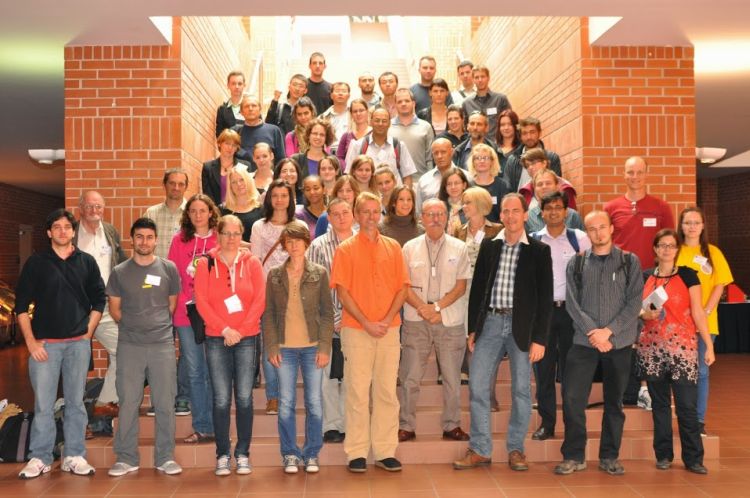
Lecturers and students of the REGFLOW-MANKARST course
International Symposium on Regional Groundwater Flow: Theory, Applications and Future Development
21-23 June 2013, Xi’an, China
This symposium was hosted by China Geological Survey (CGS) and Regional Groundwater Flow Commission (RGFC) of IAH, and mainly organised by China University of Geosciences (Beijing, Wuhan) and Xi’an Center of China Geological Survey. There were 33 invited speakers from 12 countries. The symposium covered different aspects of the theory of regional groundwater flow, including recent advances, study methods, applications and future development. More than 160 delegates attended this Symposium.
- Read the summary of the symposium written by Xiao-Wei Jiang here and take a look at the report illustrated with photos.
- The symposium proceedings can be downloaded here.
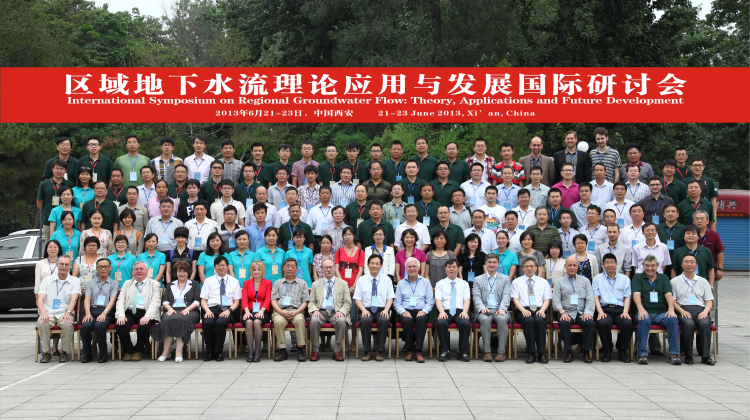
Participants of International Symposium on Regional Groundwater Flow
Business meetings of the Commission in 2013
Two business meetings of the IAH Commission on Regional Groundwater Flow were held in 2013.In June 2013 it was organized in Xi’an (China) during the “International Symposium on Regional Groundwater Flow: Theory, Applications and Future Development”. In September 2013 it was held in Budapest (Hungary) during the “International Symposium on Hierarchical Flow Systems in Karst Regions”.
RGFC Meeting in Budapest, Hungary RGFC Meeting in Xi’an, China
Technical Session on Regional Groundwater Flow at the 39th Congress of IAH in Niagara Falls, Canada, September 2012
The first formal activity of the RGFC was the organization of a Technical Session on Regional Groundwater Flow at the 39th Congress of IAH in Niagara Falls, Canada, September 2012. Conveners of the Session were J. Mádl-Szõnyi, J Carrillo Riviera with a contribution of J. Tóth. Twenty-seven oral (with 6 invited speakers: O. Batelaan; L. Barbour; J. Gomez; X-W, Jiang; J. Tóth; C. Voss) and several poster presentations were made, with attendance generally over 60. A successful kick-off party of the RGFC also was held on the Congress’ first day.
First Business Meeting of IAH’s newly created Commission on Regional Groundwater Flow
The first Business Meeting of IAH’s newly created Commission on Regional Groundwater Flow was held at the 39th Congress in Niagara Falls. Close to 40 potential or already registered Supporters attended the meeting. The election of the Board of Officers was completed by on-the-spot voting which followed a previously held online balloting. Dr Larry Bentley and Mr Dan Palombi of Canada formed the Election Committee. The newly elected Board Members are the following: Chair: Prof. Judit Mádl-Szõnyi (Eötvös Loránd University, Hungary); Vice Chair; József Tóth, Professor Emeritus (University of Alberta, Canada); Co-Chair-1: Prof. José Joel Carrillo Rivera (UNAM, Mexico); Co-Chair-2: Prof. Mengui Jin (China University of Geosciences, Wuhan). Based on a unanimous decision of the Board, Dr Xiao-wei Jiang (China University of Geosciences, Beijing) was invited to join the Board as Co-Chair-3.
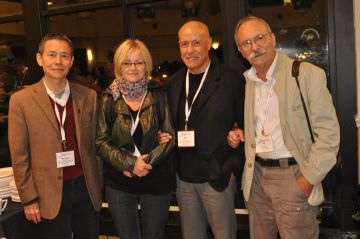
The newly elected Members of the Board of the RGFC: Menggui Jin (China),
Judit Mádl-Szőnyi (Hungary), Joel José Carillo (Mexico), József Tóth (Canada)
RGFC established
The mission of the newly created Regional Groundwater Flow Commission of the International Association of Hydrogeologists (IAH) is to foster internationally the research and practical application of regional groundwater flow. Thus the Commission intends to develop interfaces with other IAH Commissions and other organizations to achieve this mission.

